#or book or show that touches on a different narrative and view of the apocalypse genre of fictional storytelling
Explore tagged Tumblr posts
Text
for a while now I've been trying to get into either designing concepts around apocalypse stories that aren't viewed or told from a white perspective, but also getting into reading and conceptualizing an apocalypse that really never stopped for a group of people, that of which, when looking at stories like fallout, for some...it's happening a second time.
and a lot of popular media really doesn't cover character experiences or environmental design based up on that the apocalypse for these characters never stopped or is happening in a quick devastating way a second time.
#irrelevant babble#but also kinda relevant to the [mostly corporate pushed] re-sensationalized popular hyping of a diluted storytelling of fallout#I speak for myself about this but also...maybe I do need to just find either another game (probably indie)#or book or show that touches on a different narrative and view of the apocalypse genre of fictional storytelling#I would say that's what we all should do but that's erroneous#because of the impact that said franchise has had it's harder to just drop it for something better for a lot of people#I hope there's at some point the same energy in finding other media about the apoc genre that people can get into#that's NOT based on fallout but is based in the storytelling of how to survive an apoc environment and situations thereof#much like how there's other ttrpgs that aren't DnD#*sigh*...it's a lot of work to get into at times...but at this current moment...it's worth the trouble to dig outside of the cave#and find some better light at the end of it
3 notes
·
View notes
Text
Thoughts about Season 3 (and why Season 2 exists at all)
That makes it sound like i didn't enjoy S2 - I did, even the ending, once I'd recovered. But I had some thoughts which might be interesting for people who haven't read the original GO book, or who read it after seeing S1, because I think some of the differences might be easier to miss like that. [Spoilers below, obviously]
Neil said when he started talking about S2 that it would exist to bridge the gap between where GO the book ended and the sequel would have begun, had they ever written it. And this is interesting, because why would the TV series need to tell 6 episodes worth of bridging story when the books didn't? Certainly there are story details that can be told better or more efficiently in narrative or on screen, because they're very different media, but I don't think that accounts for a whole series.
The thing is, the book and S1 end in very different places. In S1, we get the dramatic trials, the triumphant reunion, the confidence that our boys are on their own side now. In the book, our boys never quit their jobs. The whole exchange from the book (which Neil replaced with the trials for dramatic effect) reads like this:
Crowley gave him a sideways look.
‘Your people been in touch?’ he said.
‘No. Yours?’
‘No.’
‘I think they’re pretending it didn’t happen.’
‘Mine too, I suppose. That’s bureaucracy for you.’
That's it; the boys suffer no consequences for their actions (possibly because their actions were a bit less effective in the book, they show up to try to avert the apocalypse and put together one distracting conversation, but Adam and the humans do the actual work). More importantly, they haven't quit and they haven't been fired; there's no reason to think they won't continue to receive assignments once Heaven and Hell get to grips with the continued existence of the world. There is no "our side". So if S3 is to follow what the book's sequel was going to cover, S2 had to get us back to where the book left off, with our boys on opposite sides, so that Aziraphale can be tasked with organising the Second Coming (and hopefully screw it up as badly as Crowley did the baby swap).
So my view is that, in giving us the trials as a very satisfying ending to a stand-alone series, Neil actually painted himself into an awkward corner when it came to the sequel, and had to use S2 to get the characters back where they needed to be.
All that said, here are some things I'm hoping for in S3. Some of these might be mutually exclusive but that's fine, any assortment is good:
Crowley reads some Jane Austen, and learns how humans work through arguments (i.e. through meaningful apology and personal growth, not by sleeping for 80 years).
Aziraphale has a series of increasingly disappointing experiences in Heaven, which lead him to finally resolve his persistent difficulty with the concept of "good" not lining up with his personal morality of what is "right". Perhaps he has a chat with Jesus about it, I'm guessing he would have an interesting perspective on this.
Metatron had to get Aziraphale back on side because he is the angel Israfil, who in Islamic tradition is the one who sounds the final trumpet (there's a fantastic meta post about this somewhere on here and I would love that to be true).
Crowley goes back to Hell. I know this one's controversial, but we've never seen Crowley actually lean into his demonic nature, and there's a vacancy Below too, right? And it would really add some weight to the inevitable love confession if Aziraphale has to admit that he loves Crowley warts and scales and horns and all, not because he's clinging to the memory of an angel who doesn't exist.
One of the residents of Soho is revealed as having been an undercover demon watching the bookshop. There's just too many slightly odd moments in S2 that feel like they're foreshadowing something.
Anyway, there's my assorted thoughts; I'd love to hear yours.
#good omens season 2 spoilers#good omens s2 spoilers#gos2spoilers#good omens s3 theories#wild speculation
112 notes
·
View notes
Text
I WATCHED GOOD OMENS IN FRENCH SO YOU DON’T HAVE TO
and it wasn’t that bad. Here are my thoughts, barely edited as I wrote most of them while watching the show.
EP 1
OK i like god’s voice so far
possibilité d’embarras gastrique is a good formulation, I wonder if it’s the same in the book ( I think I kinda need to read it in french now...)
aghghdhgs « primo-délinquants »
of course subtitles don’t match the audio for a variety of technical reasons but when you get things that have very different underlying meanings i find it… not good This one about Crowley being evil / a demon : subtitles : « c’est ton travail » - « it’s your job » audio : « c’est dans ta nature » - « it’s in your nature » i mean dang
crowley sounds like a little shit asking az about his sword
« T’AS FAIT QUOUA » - he just loses his shit (kinda giving me some le coeur a ses raisons vibe)
ok crowley sounds very nerdy when he tries to explain that he took down the phone network, i think i actually like this voice acting
ligur sounds… very suave (im a little ill at ease)
crowley getting called mon chou by satan freddie mercury is a thumb up from me
i see the part where aziraphale speaks japanese wasn’t dubbed over and we can still hear michael sheen. it’s a bit disturbing considering french aziraphale has a higher pitched voice (and he sounds soooo much more anxious than sheen, give this angel a xanax )
“sandwich bœuf cresson” ( beef and cress sandwich ) deirdre really who makes this kind of sandwiches
im being reminded that the chattering nuns prepared little cut outs for their explanation about the antichrist switch… such dedication to useless crafts (it made me laugh on my first viewing and it’s still funny to imagine that some of them either ordered or built these things themselves just so they could make this two minutes long presentation for the most important act of their satanic nun careers)
retire-toi vil démon infernal, créature des abysses XD i swear az doesn’t sound even remotely convinced when he is saying the « get thee behind me foul fiend » line in french, it’s just too over the top for credibility, it sounds like it’s straight out of some super intense dnd session
they still can’t say bouillabaisse (which, like, weird because french, but still valid). nice touch is crowley couldn’t say soupe de poisson (fish stew) either and said poupe de soisson (sish ftew)
warlock mah boy how can you be a teenager and not like dinosaurs
c’est un dinosaure un nullosaure plutôt - apply burn heal
La façon dont warlock s’est exclamé « C’EST NUL » m’a fait penser au nain de naheulbeuk
the english version has nothing on french speaking aziraphale for the second hand embarrassement during the magic tour. it’s over 9000 i literally hid my head in my jumper when he was presenting harry the bunny. Horrible experience, 0/20, would not recommend
EP 2
oooh agnes has a lovely voice !
why is young newton having such a quality dub for the three sentences he has to say
dick turpin’s name is jesse james (tbf dick turpin is not known AT ALL in france, i discovered him reading good omens)
shadwell is pure chaos (as expected). No particular accent for him though, the chaotic energy was probably enough. Would have made me laugh if he had like, a chti or a marseilles accent.
aziraphale is so fucking stressed out by crowley’s driving i thought he was gonna explode
« tu es un gentil garçon » => « you’re a nice boy » said az to crowley DANG THAT’S SO INFANTILIZING AZIRAPHALE YOU’RE TALKING TO A DEMON FROM HELL NOT TO PINOCCHIO
ARGH FIRST MON ANGE OF THE SERIES i’m hit straight in the heart
anathema’s mom doesn’t have a spanish / latino accent at all when talking in spanish…. why...
dog being called toutou is definitely adorable (it’s basically « doggy » but way cuter imo)
tickety-boo has become ça gaze. that’s valid. it’s corny but i still use it unironically from time to time so ... i stan
EP 3
« je répands la fomentation » « i’m here spreading foment » « quoi tu fais des crêpes au froment ?????? » « what you’re making crêpes with wheat ??? » love the fact that we shoehorned in one more ref to crêpes
az called crowley mon cher camarade, unintentionnal communist propaganda ftw
« pas de repos pour les… bah, pour les bons » « no rest for the… good » – az was so deflated about the ineptitude he realized he was saying, he felt zero percent commited to his sentence
i was wondering how they would play aziraphale not being able to speak french in the bastille and they opted to have him stutter a bit and say to his executionner « excuse me i’m anxious » XD
« vous êtes le 999e aristo à mourir par mes soins. Mais vous êtes le premier en costume beige » « you’re the 999th aristocrat I’m going to kill, but the first one in beige attire » yeah i guess now that az isn’t english anymore his most noticeable feature is his cream aesthetic
« c’est au cas où ça tournerait en eau de boudin » « j’ADORE le boudin » => « in case it all goes pear shape » - the literal translation featuring food in french is « turning into black sausage water ». I don’t know what pear shaped inspires to english native speakers but the mere mention of boudin always make me giggle, it’s such a funny word and such a funny food
OH !!! no terrence rampa for the tv series, we’ve got anthony J. rampa. Rip terrence petit démon parti trop tôt :’(
« tu roules trop vite pour moi rampa » SERIOUSLY i know we can still infer « rouler » (here as in driving, but literally rolling) as a metaphor for their relationship but you could have said TU VAS TROP VITE that would have been so much better argh
has anathema got an emergency stock of potteries to break in case of emotionnal crisis ?
« Rampa, un démon très futé, il m’oblige à redoubler d’effort » « crowley, a very clever demon, he forces me to make double the amount of effort » oh so admitting you’re making an effort there aziraphale ? :))))))
dang i really want to know how shadwell said that major milk bottle died because not only did he die in combat but aziraphale’s reaction is a bit intense, it must have been quite a tale (this could be a crack fic prompt : «The Epic Tale of the Death Of Major Witchfinder Milk Bottle, by Sargent Witchfinder Shadwell» )
des sorcières et des phénomènes sorciéreux x)
CROWLEY CALLED AZIRAPHALE DUCON ?????? EXCUSE ME ????? #NotMyCrowley #CrowleyWouldNeverDoThat #CancelAnthonyJRampa2K20 => ducon would be an insult, the gathering of du and con, con being a very nasty but common swear word, and associating it with du- makes it extremely patronizing. it’s like « absolute pathetic digraceful moron +++ ». thanks i hate it *frowny face *
EP 4
l’apocalypse c’est pour aujourd’hui juste après le goûter : it could be translated as « apocalypse is scheduled for today right after tea time » except that « goûter » is not quite tea time but rather the little sugary snack kids take when they come back from school and that most adults drop out of (i haven’t and i’m sure az hasn’t either). thanks aziraphale for having exclusively food related notion of the time because tbh same
ligur has no right to be this sexy between ariyon bakare and his french voice actor that’s just not allowed
radio crowley’s voice vs french ligur’s voice, who has the sexiest voice : FIGHT
(jk french agnes nutter’s voice is by far the sexiest)
gender neutral doesn’t ‘quite’ exist in french but pollution has been assigned a female voice actress and masculine pronouns (i’m saying it doesn’t quite exist because officially we have no gender neutral, but it’s a serious wip among lgbt+ circles to the point where it’s started being used in a few medias)
hastur « en attendant qu’un plombier vienne » / « while waiting for a plumber to come » does hell have a special plumber unit or do demons have to call on human plumbers for their pipes damages ? Dang hastur having to call a human plumber for hell’s plumbery is another damn good writing prompt for a crack fic
Michael is called Michel in the subtitles but Michael in the audio *shrug emoji*
EP 5
to get a wiggle on has become « il faut qu’on se remue les fesses », literally « we need to shake our butts » like, yes, se remuer les fesses is a common expression to say « we need to act in order to get things done » but it really casts the image of people shaking their booty to some music and obviously crowley thinks the same Weirdly enough I have almost nothing to say for that episode. Sorry. But we’ve discovered most voice actors and actresses so far and no bit of dialogue really struck me as worth discussing or pointing fingers to mock it.
EP 6
« on va BROUTER quelques derrières » - « we’re gonna lick some butts » OK THIS IS UNQUESTIONNABLY FAR SUPERIOR IN FRENCH THAN IN ENGLISH you thought LICKING butts was good ??? you really thought that ???? AZIRAPHALE HERE SUGGESTS TO GRAZE BUTTS. TO NIBBLE THEM. TO EAT THEM. TO. MUNCH. ON. THOSE. BUTTS!!!! not just licking, guys. This is as serious step beyond licking. (oh yeah he should have said « botter » instead of brouter btw, which is really just kicking, fyi)
« moi je crois en la paix, pétasse ! » wow, language, pepper (fyi i think « pétasse » is far far worse than « bitch » even if it means roughly the same, pétasse is almost never used while bitch is rather common, so it’s a swear word +++)
Dagon sounds like she’s got a nasty cold. #GetDagonIbuprofen2K20
I can confirm that Crowley offers Aziraphale to not just stay at his place, but to move in with him. « tu peux t’installer chez moi si tu veux ». omg they were roommates.
Bad translation strikes again : i don’t know why, but the french dub doesn’t have the « tickety-boo » / « ça gaze » being referenced as Rampa / Aziraphale is being knocked down, which is… a real mistep. It was narratively significant and I’m quite mad the translators missed it.
The Jesse James explanation from Newt has become very nonsensical, instead of the neat and to the point pun « wherever I go I hold up trafic » we’re getting a circonvoluted « because it’s a crime to mechanic’s diligence ». I’m not judging that one too hard, I have no idea how to make it better, and that’s probably how it was translated in the book as well thirty years ago, but it definitely doesn’t have the same impact. On the other hand, it definitely IS a very bad joke that doesn’t even deserve a chuckle, so Anathema’s embarassement really matches the audience’s (aka mine).
OVERALL :
I wasn’t convinced by Crowley… I mean, Rampa’s voice at first, but as the nerdiness showed up it really grew on me. I still think that french dubs have often problems with some voice inflexions every here and there, and for instance in Rampa’s case it was when he was annoyed or frustrated ( at the Globe when complaining about horses and Shakespeare’s plays that aren’t comedies, and also when discussing Azirphale’s magic tricks, it’s like… there is a step between having the right amount of grumpy complaining and overdoing it that is overlooked. It’s overacted, it should have been a bit quieter imo. I don’t mean to criticize voice actors too hard either but as an audience watching french dubs this is a very recurring problem and it always feels off to me. It’s actually one of the main reasons I avoid french dubs whenever possible.)
I have a hard time judging Aziraphale’s voice dub because it clashes so much with both the idea I had formed with it when I read the book and Sheen’s delivery that I just… kinda filtered it. It was too high pitched for me, and too anxious (though for this last point I must admit it could be funny at times, but I’m not fond of this character portrayal). The rest of the cast was rather good, nothing to complain about. There wasn’t anything stellar either, but everything that needed to be conveyed was and it was professionnal. It was also very homogeneous, no voice really struck me as being way too bad or way too good compared to the others, so it was really consistant.
So I don’t have much to complain about overall despite a few wonky translations here and there, BUT there is one thing I felt very robbed of : Crowley calling Aziraphale « mon ange » happens only once, when giving a lift to Anathema, and I’m almost certain they translated it that way because otherwise the joke about Anathama mistaking them for a couple wouldn’t work. So, they were forced to make it that way. The rest of the time Crowley calls Aziraphale « l’angelot », and despite being literally translated by « little angel », it feels sarcastic more than anything else ( the « L’ » in front of « angelot » is part of the reason why, it creates some distance, the other reason being that this word in itself has a very corny vibe and people being affectionnate to each other wouldn’t use it as a term of endearment). So, that’s a shame.
I like the English dub much much MUCH better than the French, but the french wasn’t nearly as bad as I was expecting it to be. The voice actors and actresses were quite good, the dialogues mostly faithful and endearing despite a few really missed steps. It really had its moments. Props to brouter des derrières, that one was fantastic.
#good omens#french#french omens#tv omens#my stuff#meta#review#long post#text post#i hope you found this entertaining :)
591 notes
·
View notes
Text
Favorite Media of 2020!
There was a large swathe of this year during which I was unable to concentrate on reading (as there probably was for a lot of other typically-frequent readers), so, as a result, I ended up listening to way more podcasts and watching way more TV shows. Not a bad thing, but boy did I read way less books than usual.
However, for the first time in a while, the amount of fiction I read was about equal with the amount of nonfiction I read. Last year’s reading resolution was to read more fiction, so...success??
I did read a lot of phenomenal fiction when I had the energy to do so this year.
Books - Fiction
The Martian - Andy Weir
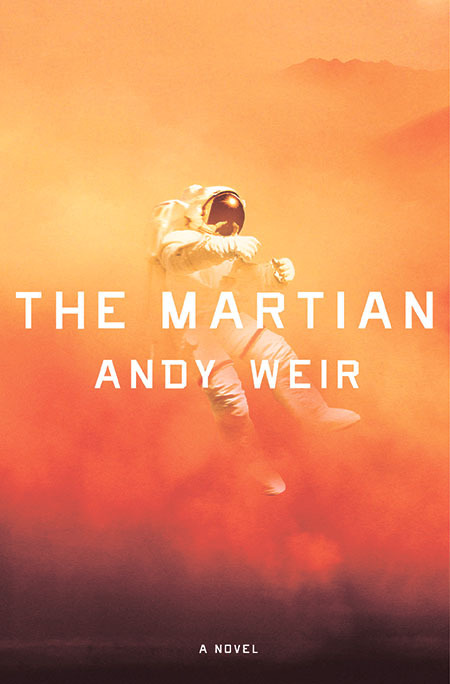
This book is the hardest of the hard sci fi I think I’ve ever read. Every single aspect of it is minutely researched and calculated. The author literally wrote equations to write this book. The science is insanely impressive and yet...it never loses its sense of humor or humanity in the mix. In fact, they’re the thing that drives the entire story.
Warlock Holmes - G. S. Denning
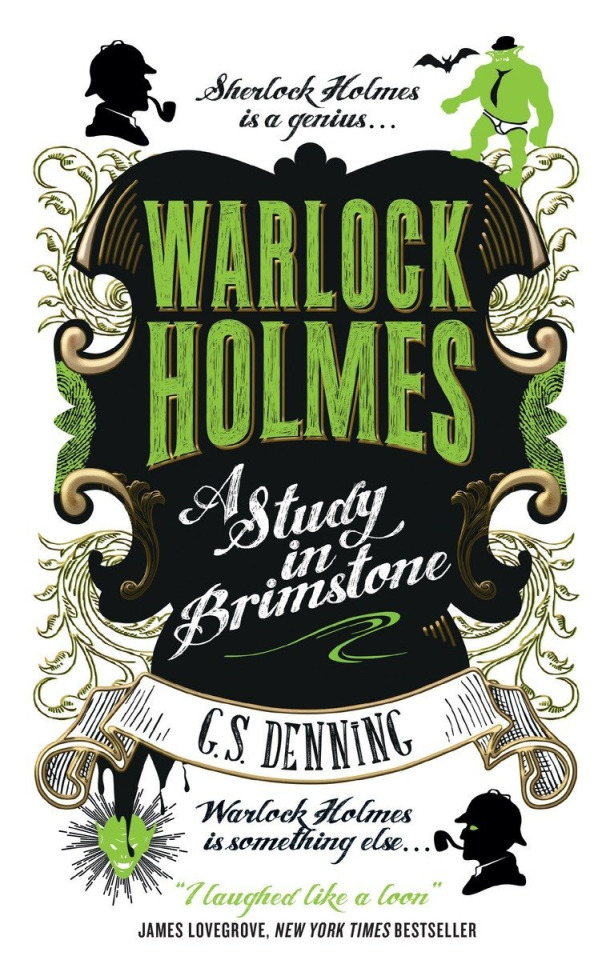
Way early in the year I was strolling down the fantasy aisle at the library, when this cover caught my eye. I took one look at it, went “oh, this looks silly” and...proceeded to devour the entire series in a matter of weeks.
It is very silly. Especially when it’s pointing out something that was silly in the original. There’s something so satisfying about Watson immediately answering Holmes with the correct number of steps in their flat when he’s trying to make his point about how most people don’t pay attention to things like that.
World War Z - Max Brooks
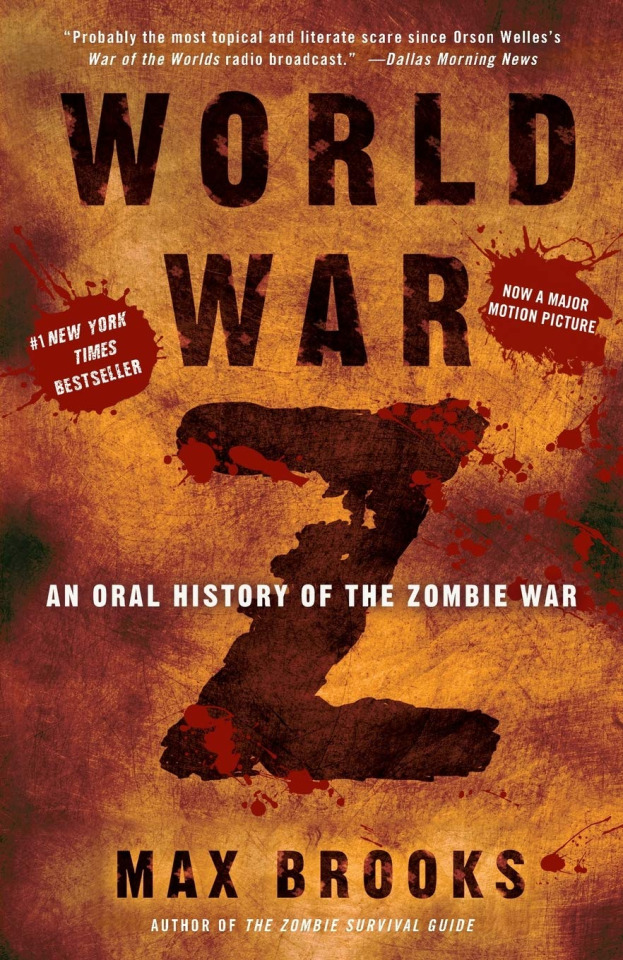
Every single scenario in here could easily support an entire book. A park ranger whose job it is to contain the yearly zombie spring thaw? HECK YES. I’d read tens of thousands of words about that. A Chinese admiral who defaults, steals the government’s premier submarine, loads it up with the families of his underlings and takes to the sea for years to live in the maritime economy that has sprung up in a world where everyone is trying to escape the shore? That could be an entire movie on its own.
Every chapter was more creative than the last and as a huge worldbuilding fan, this book was so, so fun.
An Unkindness of Ghosts - Rivers Solomon
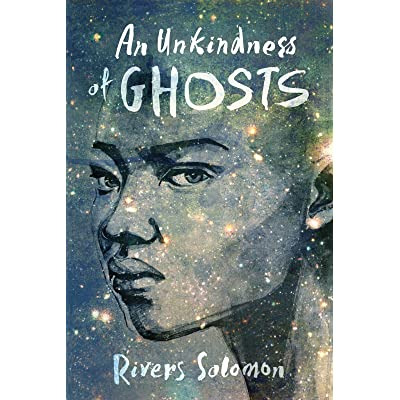
In which a queer, neurodivergent protagonist solves a mystery on a spaceship which is a microcosm of antebellum era politics! This had a beautiful, mysterious, wonder-inducing writing style and it was a joy to peer into the wildly differing minds of every single character.
Books - Nonfiction
Underland - Robert MacFarlane
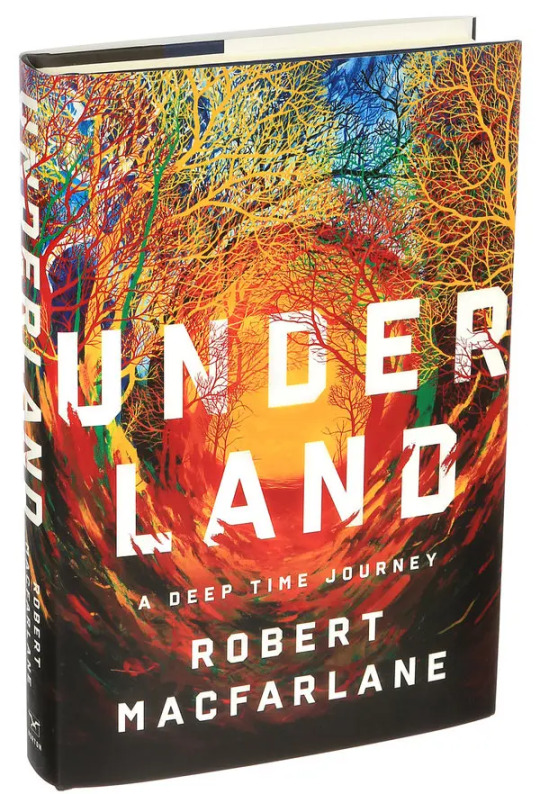
In every chapter, the author visits a different hole. Basically.
It’s an exploration of caves, catacombs, mines, nuclear waste facilities and the hidden underbelly of every forest. It was fascinating. And fundamentally changed how I look at time.
Rejected Princesses - Jason Porath
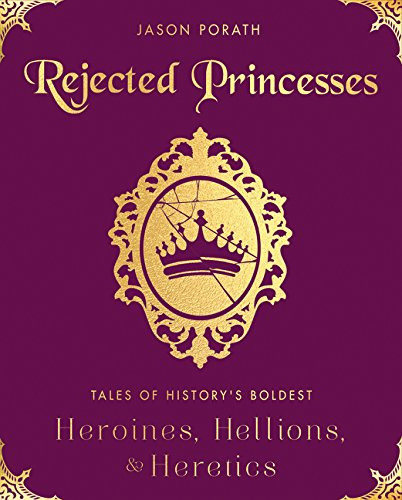
After years of having enjoyed the web entries, I finally got my hands on the first book and was not disappointed.
There are the more entertaining entries, of course and the art is as charming as always, but what struck me the most were the more difficult stories. The deeper you go into this book, the more horrific it gets. The author does not hold back on the indignities suffered by the historical figures he writes about. It’s terrible...but also very, very illuminating.
The Gift of Fear - Gavin De Becker
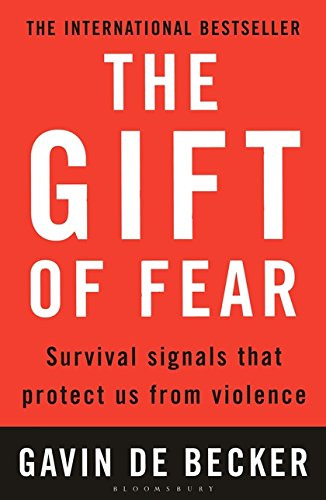
This book - while maintaining all the essential information in it - could be pared down to one sentence in a sea of blank pages and that sentence would be: trust your instincts. End of story.
But in a world where instincts are either customarily suppressed or going haywire, it’s not quite that easy, which is why I’m glad there is more to the book.
I picked it up thinking “ha ha, betcha can’t help a person with anxiety who fears all the time already” and...what it actually ended up doing was giving me the tools to differentiate between real fear and unfounded fear. And did help with the anxiety quite a bit.
Fanfiction
Watch Over Me - cakeisatruth
A Bioshock fic from the point of view of a little sister who is learning how to trust and be an ordinary child again. Dark and sweet. An excellent combo.
All That is Visible - Ultima_Thule
An exploration of a minor character in a well researched historical context? That’s my jam! How did they know?? A Tron fic about what it’s like to be a female programmer in the 70s.
Graphic Novels
The Adventure Zone - McElroys + Carey Pietsch
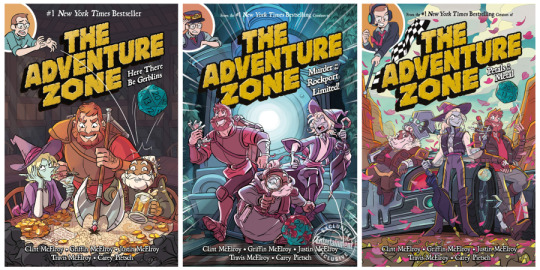
Yesssssssss! It was a running-to-the-library type event whenever my library got a new volume in. The jokes are so good, the art is so lively and the ways in which they added the details that the podcast couldn’t necessarily get across is *mwah*
Trail of Blood - Shuuzou Oshimi

Hoooooooly shit, the art style of this one!! It’s beautifully detailed and expressive, sure, but the real draw for me was how it changes with the emotional state of the main character. There’s this sequence in which he’s consumed with anxiety at school and all of his classmates become blurry and unfocused, until they can’t be recognized as humans at all, that particularly sticks with me.
It’s a horror story about a kid who witnesses his loving mother push his cousin off a cliff for seemingly no reason and is then obligated by her to keep the secret, which is eating him from the inside out. It’s so good, guys, please read it.
Level Up - Gene Lien Yang/Thien Pham
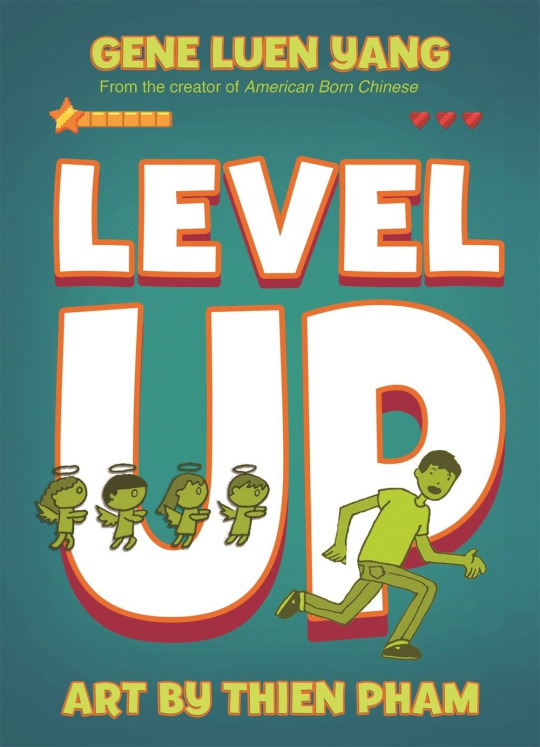
A story about a kid who is haunted by his late father’s desire for him to become a gastroenterologist. It’s funny and touching and the ending gave me what I can only describe as a feeling of exhilaration. Y’know that feeling when something unexpected but not out of left field, perfectly in tune with the narrative arc and gut bustingly funny happens, all in the same panel? That one.
Film
Searching
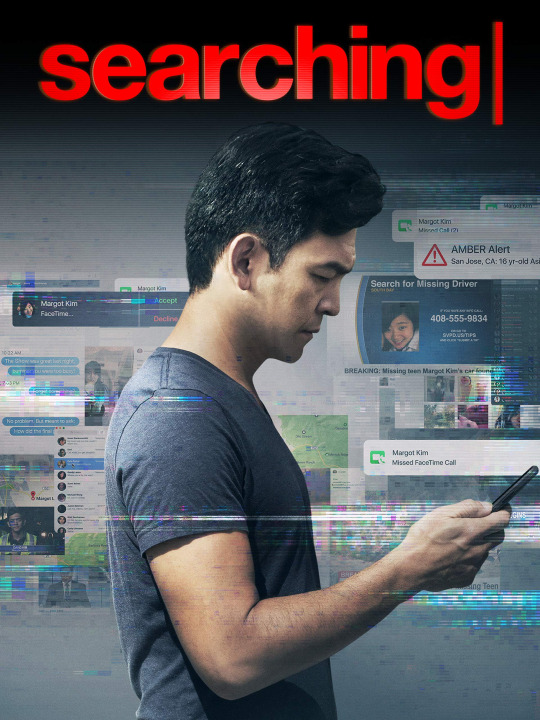
This is a fairly standard thriller about a dad trying to find out what happened to his missing daughter. It’s also found footage...but not in the usual way, which was what made it so compelling to me. It’s told through the dad’s phone calls, google searches, social media interactions, news footage, security cameras and webcams. It was such a cool way to tell a story.
Train to Busan
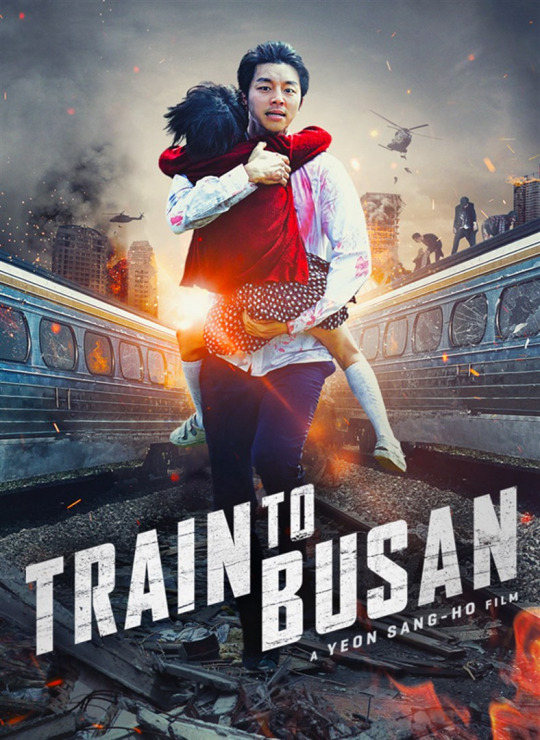
There’s a lot that’s already been said about this movie and I don’t think there’s much more I can meaningfully add to that. Suffice to say that ya gotta take care of each other if you’re going to survive a zombie apocalypse!!
TV Series
My Brother’s Husband

As close to a perfect adaptation as a person can get (barring the entire conversation in English which was...oof). I was so happy when they took it a step further and showed Kana and Yaichi actually getting to meet Mike’s family.
Zumbo’s Just Desserts
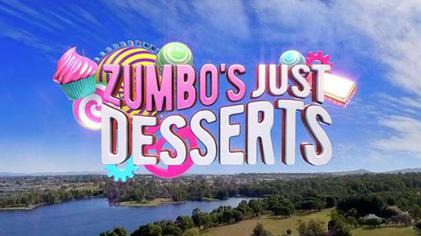
I watched a lot of baking shows this year. Like...a lot. They were my much-needed comfort viewing for the year and this one was my favorite, even over The Great British Baking Show (which I LOVE). Why? Because the pastry chef for whom it’s named makes such bizarre and wonderful desserts and fosters an environment in which the competitors do the same. I’ve never seen anything like a lot of the desserts that make an appearance on this show. Every single episode was an awesome surprise and so help me, this show had better get a third season.
She-ra and the Princesses of Power
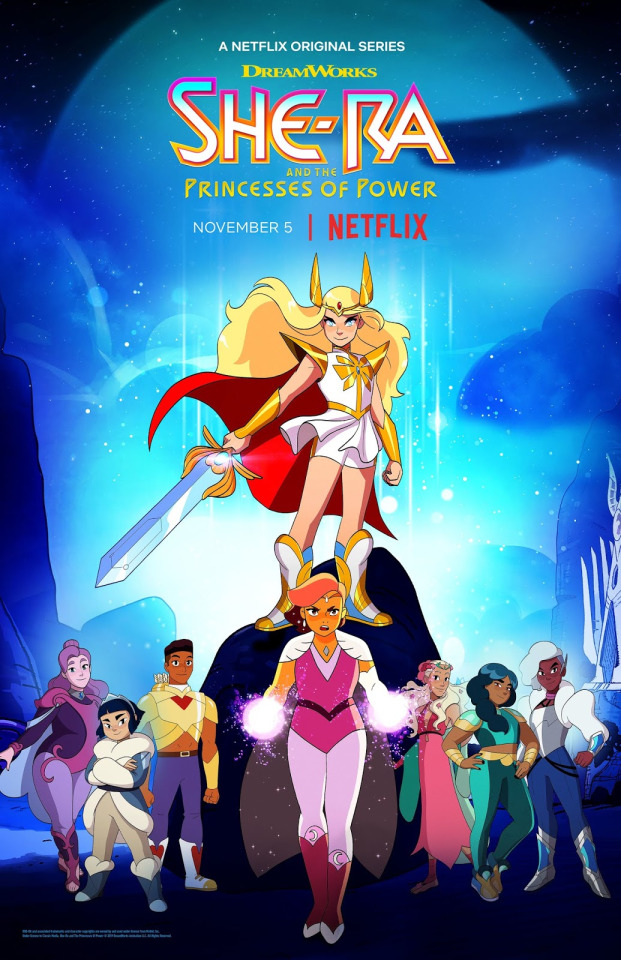
There’s also a lot that’s been said about this one, so I won’t say much more. Suffice to say: DAMN. That’s how you do an 80s toy tie-in cartoon remake.
Infinity Train
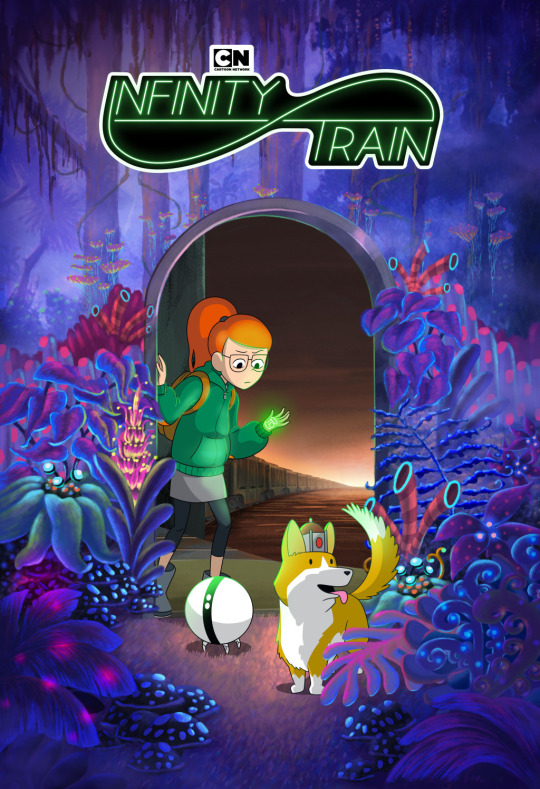
This show’s premise is probably the most unique I’ve seen in recent years. Its balance of comedy, horror and existential dread is also *mwah* I also love how much it trusts the viewer to figure things out on their own.
Primal
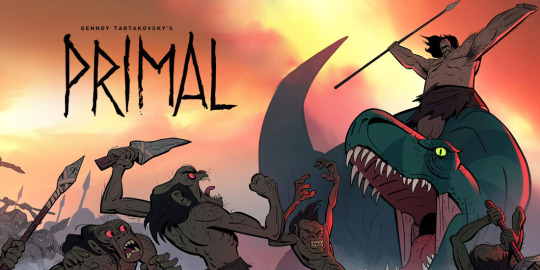
A late entry sliding in before the year ends! I finally got to watch the second half of the first season last weekend and it was EXCELLENT. The pacing, the brutal fight scenes, the adorable dinosaur antics, the animation, the quiet moments - *mwah-mwah-mwah-mwah-mwah*
The most emotional moment for me was the part in which the protagonists watch, with sorrow, as the rabid dinosaur who’s been trying to kill them all night dies an excruciating death.
Also it sets up a fascinating new plotline right before ending in a cliffhanger!! Another one for the ‘had better get a next season’ list.
Games
Night in the Woods
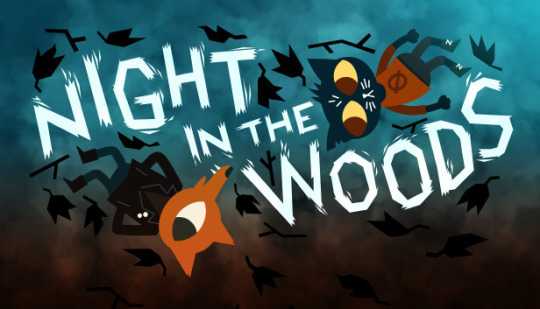
This is one that’s been on my to play list for a few years and I was so glad I finally got my hands on it. It’s like...The Millennial Experience (TM), the game. I felt so seen, playing it. The character writing was fantastic.
Prey
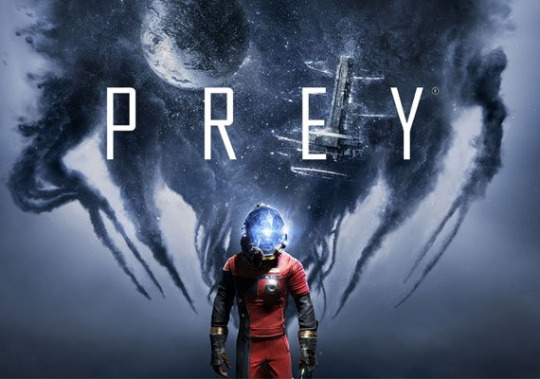
I don’t know why I put off finishing this for so long. I guess I wasn’t in the right alien killing headspace for a while?? Anyway, the setting is gorgeous, the alien biology is weird and cool, the ethics are delightfully murky and the interconnectedness of the station was really cool, especially in the OH SHIT moments at the end.
Podcasts
The Adventure Zone
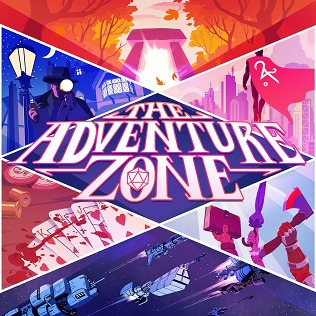
I tried to narrow this down to one favorite arc, but found that I couldn’t do it. I love Balance for its comedy and creative energy. I love Amnesty for its drama and acting. I am loving Graduation for the depth of its world and the way in which the real story behind everything that’s happened is slowly unfurling. It’s a good podcast all around.
The Magnus Archives
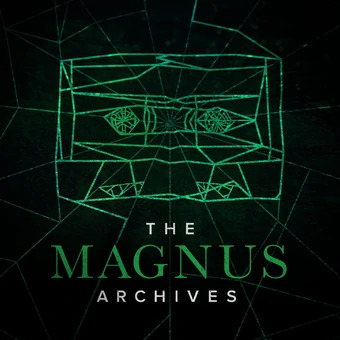
Who obsessively listened to every single season while playing Minecraft in about a month? Surely not me, nooooo. Of course not.
There’s also been a lot said on this one, so I’ll keep it brief. I’ve seen things in here that I haven’t really seen elsewhere in horror. My particular favorites were the creepy psychiatric hospital in which the horror comes not from the patients, but from the denial of the doctor to believe them about their mental illnesses and every single thing related to the Anthropocene. The one with the Amazonian village made out of trash - CHILLS.
#tma#taz#prey 2017#night in the woods#infinity train#warlock holmes#she-ra#zumbo's just desserts#a thought
10 notes
·
View notes
Note
abby can you talk on how deancas and tenrose are the same?
okay so i need to preface this with the usual…. cannot believe i am enlightened enough to be seriously discussing this in the year 2020, but i’m happy for my teen self. also there is about to be a lot of unhinged earnestness to follow, so if you’re easily succebtable to cringe… don’t read on. ALSO RIP I WROTE 1800 WORDS about just the most general and nonspecific concepts…… brb k wording myself
first off i think it’s so funny that i just went back and looked and i typed cas/ten as a one and dean/rose as a six completely independently so… that’s where my head is at.
i think the meat of the issue is the way that tenrose and deancas function both in relation to the overall narrative and each other. there are many differences of course, but at the end of the day, both relationships are positioned as the ultimate working example of what their shows are trying to be About.
i could write an entirely separate essay on the intersections between cas and the doctor, but essentially…… these are figures introduced to the audience as Beyond Human Understanding. they exist as celestial beings unconstrained by the rules of space and time, more closely connected to god than humanity. we meet the doctor farther along in his journey than castiel, but both of their character arcs are rooted in a Godlike Creature observing humanity and becoming enamored with it/driven to protect and care for it. by the time the doctor meets rose, it is well established that he has a soft spot for humanity, she’s not the one who teaches him that. but she is the one he reaches out to and leans on for support and healing post-time war, and she is the one who influences ten’s regeneration so deeply that he is made in her image/for her. castiel rebuilds dean atom by atom is hell, and upon rescuing him from the pit, finds himself similarly irrevocably altered. it is revealed to us that castiel also has had a long affection for humanity, but nothing swayed him from his ultimate duty before he met dean. and just as the doctor finds himself with a family for the first time after gallifrey with rose and her mother on the estate, castiel finds himself cut off from his family/realm, but with a new family, team free will. they lose everything, their attachment to the heavens, and find a new family and a new reason to continue, in these humans.
dean and rose also are the ultimate Human Credentials. we all know this term to be indicative of someone who confers humanity onto the other, someone who, by mere accompaniment, allows their beloved to more safely/easily navigate life. and it’s true in this sense. rose is constantly reminding ten how to Be Human (”am i being rude?”) in both big and small ways, just as dean more or less badgers castiel in the same way ( “dude. we talked about this”). neither cas nor ten would be as intimately connected with their “human sides” with their partners. but dean and rose are also Human Credentials in a broader sense, in that….. they act as character references for the rest of humanity, and by virtue of their own selves/their partner’s attachment to them, guarantee investment in the rest of the human race. castiel is more-or-less content to watch from heaven and take orders until he rescues dean and becomes involved with his life (”the moment castiel laid a hand on you in hell he was lost”). his love and affection for dean and his willingness to bend everything to keep him safe means that castiel learns to defy heaven for the good of humanity. ten has always loved humans, but he loves rose a little differently. The Doctor Needs Someone, and we see rose’s power as his human credential most strongly when she’s gone. Without rose, ten is more willing to put himself/others in danger, to make choices that will result in death, to be callous and reckless and thoughtless. rose’s presence is a constant reminder that humanity is Worth the Trouble, that he’s never met anyone who wasn’t important.
for rose and dean…. these are two, completely Normal, Average People. or so they think anyways. the burdens they carry and their inner lives are very different, but in very simple ways, they both would’ve continued their lives believing there was nothing special about them, getting up to Do Their Duty, never asking for anything special. both view themselves are caretakers, although this manifests differently bc rose is a bratty 19 year old and dean never got the opportunity to be a teenager. but both Feel Deeply in ways/levels that others don’t. each has an extremely open heart and a need to protect/provide for the little people. what ten and cas give them is an entirely new perspective, whereupon it starts to be possible to believe that even the smallest person can affect the world for better, and that they, specifically Deserve More.
THEN we have the ideas of religion/free will/fate that intertwine both shows. rtd’s doctor who was explicitly and obviously written with the intent to show an atheist universe where the human spirit and mind are enough on their own to be holy, to determine right and wrong, and to decide the events of the universe. obviously ten is often situated in christ-like positions, but he learns from humanity as much as they teach him. supernatural is a little more complicated, with an alternate vision of accepted figures of christianity, but both shows heavily emphasize the power of human kindness, passion, empathy, and individual choice. ten may not live within the confines of space and time, but apocalypses in doctor who often hinge on one small person doing The Next Right Thing, just as supernatural’s base credo is We’re Writing a New Chapter. castiel bursts onto the scene and is literally taught the importance of free will by dean, and perhaps even the importance of his own desires/needs by dean. both core relationships exemplify what it means to make choices outside the realm of fate (even whilst allowing for the existence of soulmates). yes, castiel was ordered to raise dean from perdition, but their human connection is what allows the winchesters to subvert God and move outside the printed narrative - love for a human is what makes an angel CHOOSE to fall from heaven. and ten…. well ten knows that rose is going to die. ten understands from the moment he allows himself to care for her above all others, that he is dooming himself to pain and regret and loss. but he decides to do it anyways, because isn’t the best thing an otherwordly being in love with humanity can do is to eperience love and loss on a human level? both cas and ten understand that there is no love without pain, that they will be the ones to watch their beloveds leave them, but that the Choice to love out of free will is worth it.
there’s also the element of Expression/Repression. here is where the underlying emotion remains similar but the freedom of how exactly to illustrate these feelings could not be more different. tenrose is a heterosexual relationship at the end of the day, and their storylines require them to be alone in each other’s presence nearly 100% of the time. thus, we get LOTS of familiar touching, lots of body language and casual intimacy and teasing. dean and cas…. lol. not so much. instead of physicality, we get looks, both because of dean’s own upbringing/sexuality and because they exist on the show that they do. deancas deals in the unspoken - the acts of service, the grace healings, the tense moments of battle, the lack of personal space. the expression is different, but the emotion is the same. ten and dean hold themselves back from the more Obvious open-book partners, for their own personal reasons. the end effect being that everyone on screen understands/insinuates what’s happening, and their relationship is so thick with subtext its a wonder no one suffocates. Words are seen as the ultimate step, once which cannot be overcome in normal life. both pairs use death/separation as the final step towards full transparency, but even then we are never granted the ultimate catharsis of an I Love You. castiel couches his confessions in generalizations towards groups, and dean swallows his truth even in prayer. rose says the words through a veil of uncrossable distance, but she doesn’t get to hear them back. they can Know, and we can Understand, but we cannot hear it.
lastly (for now)…. and perhaps as an ultimate summation…….. death and parallel universes and fate cannot stop them, those who are drawn to each other through heaven and hell, through time and realities. it is to be understood that will all four individuals fight to ensure that each human being is safe, protected, and able to make their own choices they are soulmates. they are soulmates who are bound to each other to be sure, but they’re not Fated in a way that takes away their free will. they’re fated by the series of choices they make, over and over again, to prioritize each other, to traverse time and space and dimension and hell to get back to one another. god cannot see castiel in his plans for the world, and yet castiel has evaded death again and again, to give dean a win. nothing could tear rose away from her doctor, and even while trapped in another dimmension, she hears his voice, she runs to him, and she finds a way to get back to him. each and every choice they make brings them back to one another, regardless of the ultimate ending. we don’t know yet if we will ever hear castiel and dean get their doomsday moment, but we do know that in order for castiel to leave dean’s side, an entirely new dimmension (the empty) will have to be in play to keep them apart.
ultimately, castiel and ten are both celestial beings with self-worth issues but a burning and true desire to see humanity thrive, directly and indirectly because of their attachment to dean and rose. dean and rose make castiel and ten more human, all while exemplifying why human is a good thing to be. dean and rose become more themselves under cas and ten’s influence, both are given more opportunity to bloom into who they are meant to be. all four become More in the presence of each other, and save the world while doing it. ultimately there is a heavy dose of tragedy in both - whether or not dean and cas get their moment is yet to be seen, but these are still Soulmates with differing relationships to mortality. but is there anything sweeter than defying god’s and fate and our own doubts to grab love with both hands, even when we know there will be pain?
#JESUS MOTHERFUCKING CHRIST#the way i could write an additional 2k words on any one of these sections/elements#anyways happy high holy day#deancas#tenrose#dw#spn#meta#Anonymous#LMAOOOOOO
46 notes
·
View notes
Text
Smokey brand Movie Reviews: The Devil is in the Details
I’ve been seeing a lot of chatter abut this Netflix movie, The Devil All the Time. It’s been getting mixed reviews but they skew mostly positive. What is really surprising is all of the buzz this thing has been getting. The word-of-mouth for this flick is mad profound. No less than six people that i know personally, have told me I'd love it. This thing was definitely on my list, Netflix has stepped their cinema game up considerably, but i have been distracted by other shows like The Boys, Raised By Wolves, and Ratched. The former two are weekly releases but i wanted to finish the latter completely before i took in any more new fare. Plus, Marebito is gnawing at me for a viewing. Still, i did finish Ratched and Marebito is an older title so i figure i might as check out this Netflix produced, Tom Holland vehicle for myself and see if the best Peter Parker can really step outside the MCU and impress, like his costar, Zendaya, does. Shout out to Zendaya on that Emmy win.
The Good
I love the direction of this film. It’s very controlled, very deliberate. This film started as a gook so there is already a story to be told, the trick is telling that story but in a way that not only represents the feel visually, but staying true to the tone of those pages. I’ve read this book years ago and never expected that it would get a film adaption but this one is pretty good at that. I credit this clearly to the deft touch of Antonia Gampos. He knows this story and he tells it well. Surprisingly, this is only his fifth directorial outing. Dude should be getting much more work after this though.
This is easily one of the most f*cked up stories ever captured on film. It feels like Silence of the Lambs in that sense but far more brutal and far less controlled. I remember the book being a great deal to finish, it’s just so goddamn cruel, and seeing that translated on film is just as brutal. I love it. I love when film challenges you like this one does. I love when there is real brutality displayed because humans can be brutal. I’m a card-carrying misanthrope so this narrative is par for the course for me.
This film is violently visceral. I mean there is gore galore but it’s never gratuitous. It’s almost always in service to the plot to prove how goddamn cruel the world within this narrative truly is. It can be shocking, it can be grotesque, it is definitely off-putting, but it’s never just for the sake of shock. I always respect when films show restraint with this kind of stuff. The gore is to accentuate not the other way around.
This cast is straight up lousy with talent. Jason Clarke, Sebastian Stan, Eliza Scanlen, Pokey LaFarge, Harry Meiling, and Haley Bennett, all turn in decent performances. It was dope seeing Mia Wasikowska in something new and Riley Keough can surprise when she has a role to chew on. They even incorporated the author of the original book, Donald Ray Pollock, as the narrator. I appreciate that nod.
Tom Holland didn’t disappoint. This dude is a real talent and seeing him in something completely different than the role that made him a star, Peter Parker, is f*cking jarring. It speaks to his range and a ridiculously bright future in this business ahead of him. His turn as Arvin Eugene Russell was staggeringly emotional. This performance, alone, should devastate any talk of type casting because kid can do it all. Seriously, there is level of barbaric malice that just infects the entirety of this the younger Russell’s life and Holland captures that underlying malice perfectly
Robert Pattinson keeps showing me why he’s one of the best in the business. The more he keeps turning in performances like Connie Nikas and Young, the more he distances himself from f*cking Edward. Reverend Preston Teagard is another one of those showings that proves Pattinson is a real actor and not some pretty face or, in the case of The Batman, a jaw for a cowl. It’s wild seeing BatPats as a fat-ass, sleazy ass, southern preacher with a disgustingly accurate drawl.
I would be remiss if i didn’t mention Bill Skarsgard as Willard Russell. Dude has been one of my favorite actors since his stint on Hemlock Grove, another Netflix property, and he’s been excellent in everything I've seen him since then. Mark in Assassination Nation, Pennywise in IT, Markel in Atomic Blonde; Dude was even part of the ill-fated X-Force in Deadpool, too, as Zeitgeist. Bill is riddled all over sh*t i enjoy and his take on the elder Russell is just another reason why.
The Bad
This thing kind of jumps all over the place with the narrative. You have to pay close attention because it does take place between two generations and several families. Everyone is interconnected, which lends itself to a novel but can be quite the burden to properly display on film. It can be a little much to keep up with everything but, if you can, if you take the time, it rewards you with an incredibly well constructed relationship tree.
It feels like a lot of this cast was wasted. There re so many great actors in this thing that only get a few minutes, a few scenes, to shine and it's a little bit of a waste. I'm not saying what they gave us wasn't excellent, i was just left wanting, just left longing for more. Seemed like a missed opportunity to me.
This thing is kind of a slog. It’s a little over two hours long and, while you watch it at your leisure, in your home, it’s still a rather large committed to demand from the common viewer, especially when there isn’t any real action to be had. I’m built for slow burn movies. I love atmosphere and purposeful film making like Alien, Blade Runner 2049, or The VVitch so this is right up my alley. Those films, however, are acquired tastes that not so many people in the general public have acquired.
As much as i can praise the overall narrative and how unapologetically adapted it’s been to film, this sh*t is not an easy watch. It is truly f*cked up and a real hard story to witness. While i, personally, believe the utter barbarism on display is riveting, I've sat through Irreversible and Raw a few times so my tolerance is pretty high to the horrid, i can see how people could be turned off by all of this f*cked up. This is a story of awful people caught in even worse circumstances. Every one who is even remotely decent, dies. There are no happy endings to be had here. This movie is an exercise in the worst of humanity so if you’re looking for a light-hearted romp to get your mind off the state of the world, this ain’t, bud.
The Verdict
I loved this film. It is an absolutely excellent picture from start to finish. The way it’s shot, the vision on hand, the adherence to the time period - all of it is masterfully guiding by the expert direction from Campos. Tom Holland turns in a brutally forceful performance that carries this film filled with one of the best casts I've seen in years. Seriously, this movie has an embarrassment of riches on hand and they use them to full effect, mostly. I enjoyed every second of this movie but i can honestly say, it ain’t for everyone. This is not a fun tale. This not a good time. This is one of those movies that leaves you disgusted with humanity and that might be way too much to ask of people, especially during this, the f*cking apocalypse in real life. If 2020 were a film, it would be The Devil All the Time. Sh*t’s that bleak and it asks a lot of your time to slum it in this sordid, bloodied, world. The performances and visuals are absolutely outstanding and the way the film has been crafted makes for great cinema but, f*ck, is it a monstrous watch. If you can stomach it, i give it the highest of recommendations but this thing can be excruciating to see.
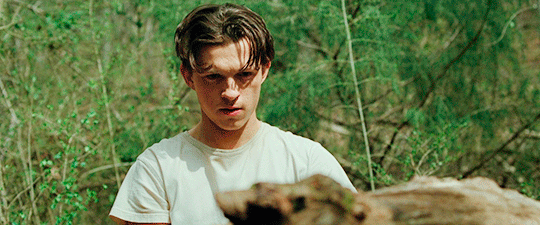
2 notes
·
View notes
Photo

The Missing Linklater.
“Any time I’m on a set with Rick I feel very fortunate.” We talk to the writers behind Richard Linklater’s new missing-person feature film, Where’d You Go, Bernadette?
An adaptation of Maria Semple’s 2012 comedic novel about a reclusive architect who goes missing just before a family trip to Antarctica, Where’d You Go, Bernadette? stars Cate Blanchett in the title role. Bernadette’s daughter Bee (Emma Nelson) sets out on a quest to find her, with Bernadette’s husband Elgie (Billy Crudup). Laurence Fishburne, Judy Greer and Kristen Wiig also star.
Directed by American filmmaking icon (and co-founder of the Austin Film Society) Richard Linklater, the screenplay was co-written with his frequent collaborators (and married couple) Holly Gent Palmo and Vincent Palmo Jr. If their names are not familiar as scriptwriters, that’s because they usually work further behind the scenes for Linklater, and have been since 1993’s Dazed and Confused, when Holly was a production coordinator, and Vince a second second assistant director.
Vince became Linklater’s first AD for the films Bad News Bears, Fast Food Nation, A Scanner Darkly, Before Midnight, Boyhood, Last Flag Flying and Where’d You Go, Bernadette?. Holly co-produced Linklater’s Me and Orson Welles (2008), which she also wrote with Vince.
Reviewing Where’d You Go, Bernadette? on Letterboxd, Tom suggests that after a “generic” opening, the film “slowly starts to show its true colors as the character of Bernadette is unwrapped… it’s a story that is touching and even a bit inspiring for those who aspire to be their own artist in life.” J Oled agrees: “This could’ve been a Hallmark special, but because Linklater generally loves humanity, and is always experimenting, this film is quite watchable, it’s warm, relatable, and modest, and I wasn’t asking for much else.” Melissa, who has read the novel, offers: “If you’re a fan of the book… the movie is starkly different. But if you’re a fan of Linklater… you’re going to love it. Cate Blanchett may be the best actor of the decade.”
We spoke to Holly Gent Palmo and Vincent Palmo Jr. about their collaborative writing process with Linklater, mining their own relationship for inspiration, and making films for the social-media age.
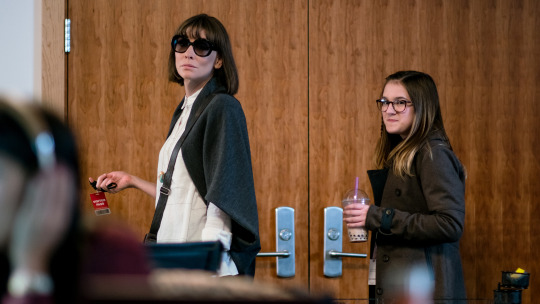
Cate Blanchett as Bernadette and Emma Nelson as Bee.
How you were brought onto the project? Holly Gent Palmo: We have worked with Rick [Linklater] for many years. We first met on Dazed and Confused, where we were on the crew, and we’ve worked on many projects with him. He’s one of our close friends. He was brought onto the project and then we read the book and loved it so he brought us on. We started from scratch, it was all based on the novel.
What did you relate to in the book that made you feel you had the right perspective to take it on? HGP: This is a movie that for me personally is very relatable because it’s about a woman who has really lost herself in motherhood and as much as she loves that journey, she’s also really looking to rediscover her passion of her past creative impulses. I think that’s something that Rick, Vince, and I all can relate to, not only as parents, but also as people trying to do something creative in this world.
Was the book’s author Maria Semple involved at all? HGP: First of all, the novel is fantastic.
Vincent Palmo Jr: Love the book, love the book.
HGP: Maria knows so much about the filmmaking process and has that history herself that she knew that she wanted to hand it off to Rick. She talked to Cate and she talked to Rick but she did not take part in the writing.
Richard Linklater seems like a great writer to collaborate with. What is it about him that makes that operate so well? HGP: With Rick, the way we work is that we talk a lot in the beginning and clearly discuss every aspect of the book. This one was particularly challenging in that it was a modern epistolary novel told in emails and transcripts. It’s not a straight narrative and it’s not told in a linear fashion, necessarily. So we had to sort out the chronology of our story and what would be included.
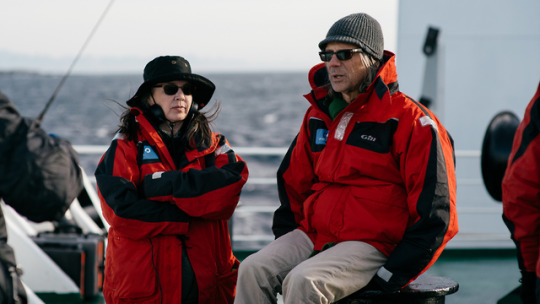
Screenwriters Holly Gent Palmo and Vincent Palmo Jr. / Photo: Wilson Webb/Annapurna Pictures
It’s the way he works with actors and everyone. It’s a really respectful, really collaborative process where everybody gets to bring to the table their own personal point of view in their own lives. With Rick, we dove into the parts of the novel we liked best and what threads we were going to pick up and carry through.
VP: It was a pretty deep exploration of the novel, of all the different characters and situations. We talked through all that and came to an agreement between the three of us for what we felt said the themes best.
Vincent, you’re also Linklater’s first assistant director, which is an interesting combination of multi-tasking. On set, would you pitch in on the script-side? VP: No, on set as a first AD I’m more concerned about the day’s work and really having everything in place and ready to go so Rick just has to say “action” and “cut”. I don’t talk at all about the script. At that point we’re all dialed in anyway.
When Holly’s around they have their conferences and I’ll be arranging the next set up. I’ve done a lot of things with Rick. I did all twelve years of Boyhood. There’s a shorthand there that I’m intent and focused on each day’s shoot and what’s coming up the next day.
HGP: By the time Rick gets to set, he’s totally prepared and ready. He has his rehearsal process with his actors. Our process is over, he’s very sure of what he wants.
VP: You can’t over-prepare, but we’re very prepared.
HGP: Except maybe in a rare instance in having to negotiate some small change.
VP: Yeah, like in what the weather’s brought or something new at a location, things like that.
Boyhood and Before Midnight are both classics of their decade now. What were those sets like? VP: I’m so happy for Rick [that they’re highly regarded]. Boyhood just stretched on. I remember there were times where we were like, “is somebody in Eastern Europe doing the same thing and it’s going to come out before us?!” We really didn’t know.
To pick it up each year and shoot it on film when all that kind of change [to digital] was in the midst of us shooting… Any time I’m on a set with Rick I feel very fortunate. To see them received in the way they were, it’s really thrilling.
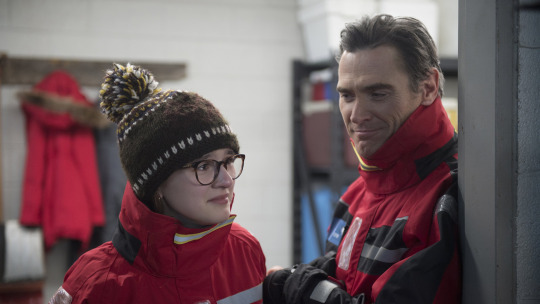
Emma Nelson and Billy Crudup in ‘Where’d You Go, Bernadette?’.
In what ways, if any, did you adapt your style to the talents of Cate Blanchett and the other cast members? HGP: We knew that Cate was interested from the moment that we began. We were always hoping to do justice to her great talent and thinking towards that. To me, there could be no-one better in that role. Cate brings so much to it.
It’s an inspiration to think that no matter what kind of nuanced emotion we write in a scene, she can carry it and do an incredible job. It gives a freedom of inspiration thinking that there’s a possibility that Cate Blanchett can be playing the part.
The book is largely renowned for the way it captures the nuances of Seattle. What types of research did you do for the characters’ occupations and their environments? HGP: Rick did a lot of interesting, in-depth research for Elgie’s technology role and the kind of things he was developing. He talked to a lot of people involved in Microsoft developing those sorts of things, to bring that in the most detailed and up-to-date way.
For architecture, Rick arranged some meetings with some really great architects to go and talk to them about the language they use. As far as Seattle goes, there’s no greater resource for that than the novel itself. Maria really knows that world and has so many funny and interesting outsider opinions about it that I felt it was the perfect way to learn about that.
What did you feel you could bring to the element of marriage when writing as a married couple? HGP: That’s interesting.
VP: That is interesting. Well, we’ve been married for 26 years.
HGP: I do think that all three of us brought in our past relationships and our current relationships to the process. I believe it’s a realistic portrayal of the quest to keep improving your life through self-discovery. It’s a unique story that you don’t really see a lot of.
That whole idea that you can’t ever really know anyone, but that doesn’t mean you can’t try—Rick really loved those words, they’re the opening words of the novel. It’s this idea that the other person is always somewhat unknowable, but you keep trying to get to know each other while you change through the years.
VP: The search continues! You find new things.
HGP: Nothing is more rewarding in life than those close relationships that last decades.
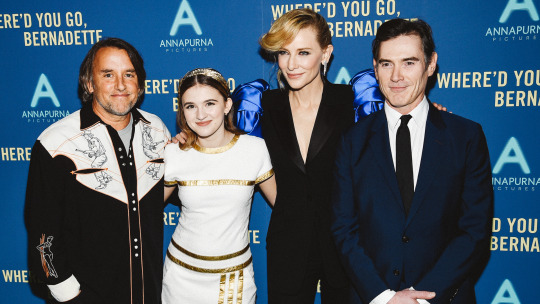
Richard Linklater, Emma Nelson, Cate Blanchett and Billy Crudup at a New York screening earlier this month. / Photo: Evan Agostini/Invision/AP
Do you think it’s difficult to write contemporary films for the social-media age? HGP: It’s fascinating when you see movies and there’s this before-and-after cell phones dividing line, because so many of the great films and their plots would have been so different if everyone was carrying a phone around.
I don’t know if it’s easier, but it is a change in your way of thinking as you realize everyone has a phone in their pocket. I think both [period and contemporary] are fun. Any kind of story or plot that you’re trying to figure out is a really fun and challenging puzzle. I notice in a lot of films they try and get rid of the phone in some way.
What was the film that got you into filmmaking and made you want to be a part of this industry? VP: Oh my gosh, wow. Jeez, that’s a really tough one.
HGP: There’s so many stages to it. There’s the ones you see when you’re a little kid that just blow you over. Those are so bound with light and emotion that you don’t even understand. I remember Apocalypse Now—that was something that blew my mind.
VP: It just kind of builds. I got a degree in journalism and then I ended up working in film so it’s hard to point to just one that really flipped the switch. I don’t know why, but I saw The Sound of Music a bunch of times when I was younger. Maybe it was just easier for my mom to take me and my four siblings out to see it.
‘Where’d You Go, Bernadette?’ is in select US cinemas now.
#richard linklater#austin film society#holly gent#vincent palmo jr#seattle#where'd you go bernadette#maria semple#billy crudup#emma nelson#austin#letterboxd
4 notes
·
View notes
Text
The Umbrella Academy - ‘We Only See Each Other at Weddings and Funerals’ Review
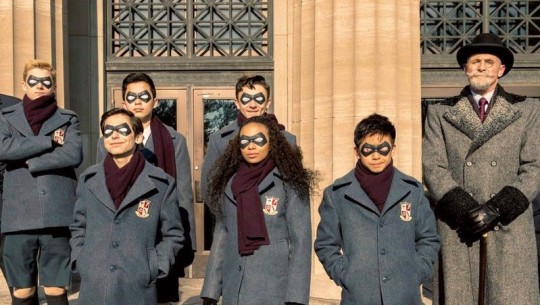
Right from the comics, by illustrator Gabriel Bá and My Chemical Romance vocalist Gerard Way, comes the winter hit of Netflix nobody saw coming. Picture a love child between the X-Men and the dysfunctional Bluths, and you’ll have the Hargreeves siblings of The Umbrella Academy.
I must confess that I myself have yet the chance to read the comics this series is inspired by, but from what I understand, the premises don’t differ much at all. On the same day down to the same minute, 43 women across the globe give birth despite not showing any signs of pregnancy up until labor. Irregular and reclusive billionaire Sir Reginald Hargreeves scouts out these women and is able to compensate only seven of them in exchange for adopting their children, all which supposedly have been born with unique abilities. For reasons known only for himself, Hargreeves raises these youths, with assistance from an android-caretaker (appropriately referred to as ‘Mom’ by the children) and an exceptionally intelligent chimp named Pogo, into becoming a team of superheroes called ‘The Umbrella Academy’.
Right away, a premise like this that takes its own shot at subverting the superhero genre had my attention and, after the pilot episode, went on to dominate the rest of my week as I binged through its first season. From the get-go, it became clear that The Umbrella Academy is a show that is much more character-centered than it is plot-centered. This is not to say The Umbrella Academy lacks any signs of a narrative, but the series’ heart and soul is the dissection and exploration of the seven Hargreeves siblings who, in ‘We Only See Each Other at Weddings and Funerals’, are reunited years later after hearing the news that father Hargreeves has passed away.
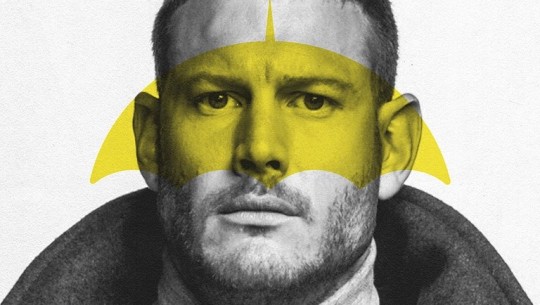
#1: Luther Hargreeves/Spaceboy. The former leader of the Umbrella Academy, Luther is the teammate with incredible super strength that is practically mandatory at this point for every group of superheroes. Presently, he operates as an astronaut exploring Earth’s moon, but returns to Earth once he learns of father Hargreeves’ passing. Picture Superman if Superman wasn’t very talented at inspiring morale or teamwork in his Justice League compatriots, and you’ll have Luther.
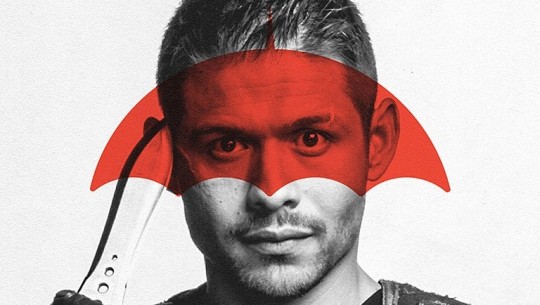
#2: Diego Hargreeves/The Kraken. In many ways the antithesis to Luther, Diego is a reckless hothead on the outside, and a bit of a momma’s boy on the inside. And unlike Luther, who maintained complete trust and faith in father Hargreeves until the end, Diego (as well as #3 and #4) has a fiery hatred for their father due to his cold, unfeeling, and abusive manner towards the children while they were growing up. Diego has the ability of accurate and expert marksmanship, and a dagger is his preferred weapon.

#3: Allison Hargreeves/The Rumor. Currently an aspiring actress, Allison returns home with her siblings while in the midst of a divorce, and if that weren’t bad enough, she has also lost complete custody of her daughter. Though her distaste doesn’t seem as passionate as Diego’s, she too harbors resentment for father Hargreeves. She has the ability to alter reality itself by beginning her wishes with the phrase “I heard a rumor…”
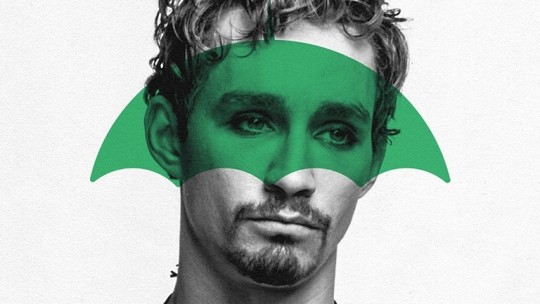
#4: Klaus Hargreeves/The Séance. Eccentric, drug-addicted, and in possession of a wardrobe that reaches every point of the spectrum, Klaus could be seen as the academy’s ‘wild card’ currently. On the surface he appears to demonstrate wit and an infectious energy for life, but internally, he loathes father Hargreeves, and blames him as well for being the catalyst for Klaus turning to his unhealthy habits. Klaus has the ability to talk to the deceased, but can only perform this when he is sober.
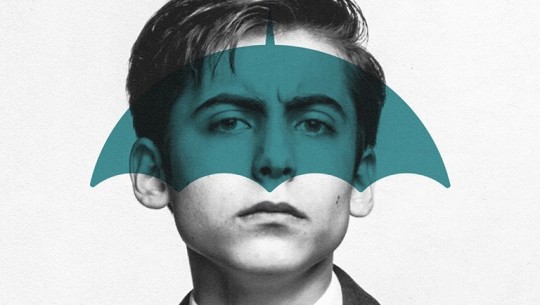
#5: Number Five/The Boy. Years before the start of the series, Number Five mysteriously vanished without a trace, and soon after, the Hargreeves siblings would begin to go their separate ways. In the pilot, Number Five returns, still in the form of his thirteen year-old self, with a warning from the future – the world will end in eight days, and Five has no idea what causes it. Though Five does genuinely seem to still care for his siblings, so much time spent lost in the space-time continuum has made him cynical, jaded, arrogant, and with a very relatable dependence on black coffee. Five has the ability to teleport, both through space and time.
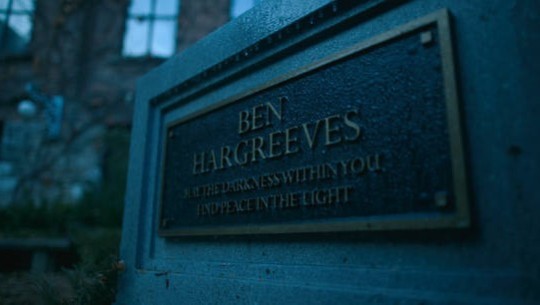
#6: Ben Hargreeves/The Horror (Deceased). Killed or passed away by unknown means, Ben’s death seems to have been another factor that drove apart the Hargreeves siblings. Aside from the fact that he has an ability to generate monstrous limbs and tentacles from his body, (which he does not relish) little else is known about Ben. Thanks to Klaus’ ability to talk to the dead though, Ben is still able to keep in touch with at least one of his siblings.

#7: Vanya Hargreeves/The White Violin. A talented violinist, Vanya seems to be the only sibling without any sign of an ability. Her entire childhood under father Hargreeves’ roof has consisted more of her acting as an assistant to train the other, powered children, and being told that there just isn’t anything special about her. Despite this, Vanya doesn’t hesitate to return home and reunite with her siblings once she hears the news about Sir Hargreeves. Since leaving home, Vanya has published a book detailing the secrets of the Umbrella Academy, and outing her siblings’ identities as well, which seems to have created a rift between her and Diego.
This is show that has nicely mastered the practice of raising some mysteries and inquiries, while also still giving the audience just enough answers to chew on for the current episode’s forty-five minute run. From the memorial service onwards, the pilot continues with scenes upon scenes dedicated to simply fleshing out these characters: what they’ve been up to since they parted ways, their relationships with each other, which siblings they bear grudges against, and which ones they’re still loyal to. But because this is the introductory episode, it does have its moments here and there that are committed for pure exposition. For example, a scene featuring Vanya reuniting with Pogo and touring the old mansion where everyone was raised abruptly transitions to the two of them specifically discussing how many days it’s been since Five disappeared, which feels less like natural dialogue, and more like something needed to catch the audience up on Five’s backstory.
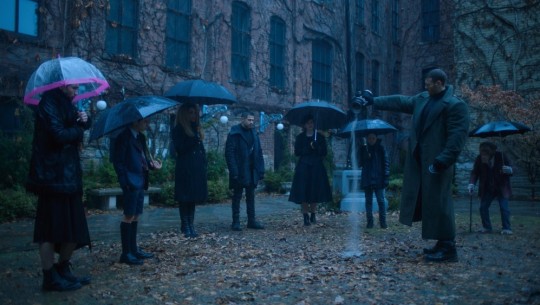
As a result of this being a setting where individuals with super-powers do exist, it’s evident from the beginning that this isn’t going to be a world exactly like the planet Earth the spectating audience is used to. What’s so engaging about The Umbrella Academy is that it just doesn’t stop there; there’s a lot of effort here put into the world-building to distinguish this series’ timeline as something that bears some similarities to our own timeline, but is clearly another world altogether. By the time we are introduced to Grace, the children’s android caretaker, and Pogo, I actually realized I didn’t even need elaborations from this show on their own backstories; I had just become so accustomed that this was a world with its own unique scientific advances and phenomena. Once you’ve laid down the law that time travel can and does exist, pretty much anything else goes.
Time flew by during my first viewing of this episode and once Five dropped the bombshell that the world is heading towards an imminent apocalypse and the credits rolled, I was hooked. The Umbrella Academy has a great start for those that enjoy nuanced characters as much, if not more, as they do good story-telling. Because only one episode is a little early for someone to be playing favorites, I suppose I won’t mention then how charmed I immediately became with the characters of Klaus and Five. Then again, from the looks of the internet around me, I seem to not be alone with that favoring.
Name That Tune:
Another wonderful takeaway from this series is its soundtrack, which sifts through multiple genres each episode, and while it often falls back on the trope of playing an upbeat tune to an otherwise extreme fight sequence, it has given me plenty of new additions to my iTunes library, starting with ‘Istanbul’ by They Might Be Giants. Never a song I would’ve thought I’d hear play during a gunfight conflict in a coffee-and-donut shop, yet here we are.
Hargreeves Humor:
Luther: “Look, I know you don't like to do it, but I need you to talk to Dad.” Klaus: “I can't just call Dad in the afterlife and be like, 'Dad, could you just stop playing tennis with Hitler for a moment and take a quick call?'"
Five: “An entire square block. Forty-two bedrooms, 19 bathrooms, but no, not a single drop of coffee.” Allison: “Dad hated caffeine.” Klaus: “Well, he hated children, too, and he had plenty of us.”
Five: “Guess I missed the funeral.” Luther: “How'd you know about that?” Five: “What part of the future do you not understand?”
Aaron Studer loves spending his time reading, writing and defending the existence of cryptids because they can’t do it themselves.
#The Umbrella Academy#Vanya Hargreeves#Klaus Hargreeves#Allison Hargreeves#Diego Hargreeves#Luther Hargreeves#Number Five#Ben Hargreeves#The Umbrella Academy Reviews#Doux Reviews#TV Reviews
19 notes
·
View notes
Text
X-23 and the Direction of the X-Men
I’ve talked a lot about what I don’t like with what Marvel has been doing, so I thought I’d talk about what I DO like with the X-23 solo series and how the X-Men line in general could benefit from doing the same…
Mariko Tamaki’s solo series utilizes elements of Morrison, Kyle and Yost, Liu, and Taylor; without being dependent on them. While examining Laura and Gabby’s histories as clones; I don’t feel like this story arc is TRYING to be ‘Innocence Lost’, ‘Target X, ‘the Four Sisters’, 'Riot at Xavier’s’, or 'Planet X’ . It’s very much it’s own story, instead of a continuation of previous stories.
One of the major reasons for this is Mariko doing something different with Laura’s clone narrative; by having her story parallel the Stepford Cuckoos, characters Laura has been around but never really interacted with.
This helps bring out BOTH a different side to Laura and a different side to the Cuckoos that we didn’t get to see before. Mariko examines Laura’s, Gabby’s, and the Cuckoos motivations thoroughly in this series; making the big motivating factor being different characters psychologies and points of view.
The Cuckoos motivations ARE relatable- wanting their family back. They also both connect to Laura’s inability to somewhat see herself as a individual- by dressing and acting as one; and Gabby’s desire for independence-be having different personalities and personal tastes. Esme wants to both be THE ONLY Cuckoo while simultaneously wanting to merge the Cuckoos power; essentially being permanently connected with her sisters.
Another big change is the risk factor; before in All New Wolverine there was little fear that Gabby was at risk. While Taylor did put her in dangerous situations; rarely as a reader did you question whether or not Gabby would come out of the situation okay. The change is, Mariko’s willingness to allow BOTH Gabby and Laura to go through conflict. While Gabby WILL more than likely come out of the situation physically unharmed, there is the question of-'How will this situation change or shape Gabby as a person?’ What changes will Laura and Gabby go through because of this story arc?
Good writing NEEDS conflict, because conflict is the biggest connector to humanity we have. Conflict can be anything from 'I lost my keys’ to more complicated conflicts like 'Who am I?’. Conflict can be Internal (man vs. self) or External (man vs. nature, man vs. man/society, ect…). But the universal truth is that everyone will experience some form of conflict in our lives and that conflict will shape us.
These elements are what have made the recent X-23 solo a really solid book (well that and Juann Cabal/Nolan Woodard’s art and inking…). It’s also the upcoming problems I see with the recent 'Uncanny’ and 'X-Force’.
Kelly Thompson, Matthew Rosenberg, and Ed Brisson ARE right-The series hasn’t released yet, so I can’t completely comment whether or not it will have these elements or not; but all of the indicators from solicits and interviews DON’T look very convincing…
If Brisson , Rosenberg, or Thompson were introducing a new villain- I’d give them the benefit of the doubt; but the character they are using is the rather overused Apocalypse.
If they were showing a different side of Apocalypse through some difference in plot, that would be one thing-but from the looks of it, it’s playing off 1995 storyline 'Age of Apocalypse’ where David Haller creates a new timeline when accidentally killing his father after traveling back in time to kill Magneto; the only minor difference appears to be is having the 'Horsemen of Salvation’ and kinda in representing Nate Grey as a messiah (a role he regularly rejected…).
We’ve seen the mutant 'messiah’ before-with Jean, with Rachel, with Cable, and with Hope. At the very LEAST you could have done someone NOT tied to the Summer’s…
We’ve seen Angel as a horseman; maybe having Angel being 'Life’ instead of 'Death’ will bring out a new facet to his character, but from the looks of it, the story will heavily hinge on his on again/off again relationship with Betsy.
Are we seeing a new team lineup-from the looks of it, not really; the focus seems to be Iceman, Jean Grey, Beast, Cannonball, Storm, Bishop, Nightcrawler, Jubilee, Psylocke and X-23.
*X-23 and Cannonball are really the only new additions.
*One of the covers heavily featured Legion, hinting that he will AGAIN play a part in kicking this story off.
*Bishop in the original 'Age of Apocalypse’ storyline was the character to notice the timeline WAS wrong and fought to fix it-so it’s not all that surprising to include him.
*X-Man was the main protagonist in the original 'Age of Apocalypse’- maybe their plan is to SUBVERT this trope by making HIM the antagonist and thus making a commentary around organized religion…but I kind of doubt it….
Pixie, Glob, Rockslide, and Armor are SUPPOSED to be the Horsemen of Apocalypse but I am somewhat doubtful that this will largely impact their characters developmentally any more than 'Age of X’ impacted Julian’s, or any of the OTHER ALTERNATE UNIVERSES have largely impacted any of the characters.
Can playing with old storyline’s and nostalgia BE fun: yes, but too much nostalgia becomes empty. It becomes desperately trying to grasp a time period long past that you are inevitably romanticizing and coloring with personal connections. It inevitably showcases how out of touch the writer is with current society…
It would have been one thing if X-Men HADN’T been over utilizing past teams and stories- but in the last few years we got 'the Original Five’ (both time displaced and living adult members…), the Exiles, Generation X, New Mutants/X-Factor hybrid, BloodStorm, Gold with a Claremont reminiscent team, Gambit and Rogue back together, Kitty and Colossus back together, Magneto reverting back to his roots as a villain, Emma reverting back to her roots as a villain, Xavier back, and multiple extinction storyline’s trying to be M-Day or the Legacy Virus…
It would be one thing if X-Men had taken a break from AU characters- but in the last few years we’ve had time displaced Original Five, Jimmy Hudson, baby Cable, Raze, clone Kid Apocalypse, BloodStorm back in focus, Old Man Logan, Exiles characters, ect…
Maybe this title is different and people are 'Pre-Judging’ it; but when in the last few years has Marvel given fans a lot to go on?! The recent interview could essentially be copied and pasted from 'ResurrXtion’-promising big changes before reverting to a overplayed status quo… Maybe this IS a new take on 'Age of Apocalypse’- but hasn’t Marvel promised that beforehand?! They promised a new take with the 'Original Five’ coming back, with the extinction plotline, and with countless other storyline’s-yet Jean and Scott’s romance is heavily the focus, the mutant population inexplicably recovers from mass genocide without any lasting effects, and little character growth actually happens.
I’m not saying this to 'rain on the writers parades’ or target them; but this has been promised BEFORE and all signs indicate this IS the exact same empty nostalgia we’ve seen for years…
I’m not writing this to be negative or condescending. I WANT to be wrong…but I don’t think I am, because I honestly don’t think the writers WOULD be getting defensive if this wasn’t a by the numbers homage to 'Age of Apocalypse’. You don’t NEED to get defensive if you have a trump card or brand new idea up your sleeve.
Whether you love or hate Morrison, Whedon, or Kyle/Yost; there’s no denying they are iconic runs BECAUSE they did something new.
Morrison created villain Cassandra Nova and countless other characters, utilized Emma as a main character to create a new dynamic, and examined population changes with having Mutants become the majority and create their own culture. Even Morrison’s representation of Scott, while controversial, still took a new look at Scott as a character.
Whedon created several characters including Danger, Armor, and Blindfold; explored Xavier’s more questionable decisions, and focused heavily on character dynamics and psychology of the characters. One of the defining relationships was the conflict between Emma and Kitty; utilizing old animosity but examining it under a new lens of Emma being a hero and interacting with Kitty (they did not interact when Emma was part of Generation X).
Kyle and Yost created X-23, creating a new examination into Wolverine’s mythos and a new dynamic. They heavily utilized some of the newer teen characters, to again create a new dynamic. While using older stories (Nimrod, William Stryker, Magik’s origin) by injecting new characters they created something refreshing instead of empty nostalgia. It also examines the darker side of X-Men, by questioning the choice of teens being recruited to essentially be a 'paramilitary group’…
Are all these writers still using old storyline’s- yes, but by adjusting lineups of characters, adding new dynamics, creating new characters, and examining the X-Men under a different social lens: it can dramatically change the story.
The original 'Age of Apocalypse’ also did this when first written by analyzing what the world would be like ruled by Apocalypse and changing character motivations and relationships.
X-Men doesn’t HAVE to change drastically; but it does need some variation. I’ve said this once, and I’ll say it again- I don’t think fans are being unfair by questioning if this was a good choice to semi reboot the X-Men. This by all appearances doesn’t LOOK like a 'Fresh Start’. Sorry but people are going to 'pre-judge’ things; it’s one of the things that sucks about being a writer.
It would be one thing if X-Men had been knocking it out of the park storyline wise, for the past few years- but the truth is, is they haven’t. You can’t blame fans for being tired of giving Marvel a chance only to watch them make the same pitfalls over and over again.
If you don’t want the criticism-maybe take a chance and try something NEW…
X-23 PROVES Marvel CAN get it right- they just need to put the same thought into the X-teams that they put into her solo.
#x 23#x23#laura x23#Laura Kinney#Gabby Kinney#The Stepford Cuckoos#Esme Cuckoo#Mariko Tamaki#x men#uncanny x men#Marvel#Kelly Thompson#Ed Brisson#Matthew Rosenberg#age of apocalypse#disassembled#writing#Grant Morrison#Joss Whedon#Craig Kyle#Christopher Yost#new xmen
79 notes
·
View notes
Text
A Game of Thrones
Inglês não? Leia em Português.
by Dias
-
(ATTENTION! Contains spoilers)
The matter I think should be addressed first is that have watched the TV series before beginning to read A Song of Ice and Fire (ASOIAF, from here on out). Therefore, this review is targeted towards those who find themselves in the same situation. For a long time I asked myself: “is it worth it to read the books already knowing the spoilers”? Well, the short answer is: yes, very much. What follows in this review is the long version of that answer.
While I am writing this, I have already passed the 20% mark of the series’ second volume, “A Clash of Kings”, and some things have captured my attention. For example, Martin’s writing skills (always very natural and accessible) and the wealth of vocabulary he employs, which is exuberant without being pedantic or stereotypical (something I have already touched on in my review of “Blood of Elves”). However, it is my belief that the author’s abilities that shine the most and stand out from the others are firstly his praiseworthy excellence in character creation and development, and secondly his brilliant point of view choices when narrating the plot’s key events. Both skills compliment each other, enriching the narrative in both form and content.
Each chapter follows on of the main characters, providing us not only with the events’ descriptions, but also the observing character’s perceptions and opinions what is happening. This choice is quite ingenious, since it underlines the capillarity and interconnection of the various sub plots that unfold simultaneously, and also gives us the readers access to the character’s insight into what is happening. The story does not have a specific protagonist (although the Stark family’s feature is quite obviously prevalent), but multiple protagonists to different storylines that cross over and compliment each other. This creates two main effects: all characters become more dense, complex and interesting, for one, and those that surround them become target to great doubt and suspicion. In the beginning of the second book, the land of Westeros is divided: there is a quarrel around the successor right to the throne and five different characters reclaim it for themselves – but no single chapter follows these kings’ perspectives. The reader is always on the battlefield or in the halls of the court, following the unwinding of plots and schemes… but never gaining access to the “true players”, the kings, nobles and courtesans that actually dictate the course of events – either explicitly or beneath the table. The only exception to this is Daenerys. Raised in exile, she still holds the look of a foreigner when witnessing the strange manners and peoples of the continent of Essos, thus preserving an experience of wonder and an aura of mystique around the eastern folk, with the Dothraki taking the spotlight.
Character development in the books is far richer than what we get in the series. By learning that Robb is 14 years old when Eddard is chosen to be Hand of the King in the court of Robert Baratheon (to contextualize: Sansa is then eleven, Arya is nine and Bran is eight), and that Daenerys marries Khal Drogo at 13 years of age, accepting certain attitudes or reckless decisions becomes far more coherent and reasonable. Not only that, but the characters are also built in a much more intelligent and captivating manner: Jon is a teenager and acts as such, overflowing with angst, conflict and immaturity. Sansa truly is a dreamy and bedazzled young girl, but in the book, as we have access to her thoughts, it is possible to see that she is actually a much more mature, cunning and shrewd character as the TV show lets on. All in all, the books offer us far richer and more interesting characters, which gather more empathy and whose arcs of evolution and transformation are far more complex and cohesive. More than that, I feel something should be pointed out: Martin builds interesting, independent and complex female characters, with desires, aspirations, conflicts and abilities very well constructed. The chapters that follow Arya are among my favorites. Beyond that, the author does not fall in the trap of representing characters without putting forth quite clearly their flaws and weaknesses, and is explicit in showing how they play a part on their shortcomings and destinies. Eddard is a man driven by honor, justice and truth – and is precisely that which yields him a public execution, the diffamation of his family, the capture of one of his daughters and the indigence of another and, were it not enough, the start of a war of continental proportions. This is, without a shadow of a doubt, a shinning example of a good plot.
BONUS RECOMMENDATION: My first contact with George R. R. Martin’s work was not with A Song of Ice and Fire. Before reading the first volume of the epic series, I had the opportunity to read one of his sci-fi short stories, called “Dark, Dark were the Tunnels”, which I found in the precious anthology of post-apocalyptic fiction named “Wastelands: Stories of the Apocalypse” (edited by John Joseph Addams) and recently translated into Portuguese. About this excellent short story, it seemed to me that it was a homage to a certain novel by H. G. Wells – but I will say no further, in order not to spoil the plot. About the anthology, which has short stories written by Martin, Stephen King, Octavia Butler and many others, I must recommend it vehemently both to those who enjoy wasteland aesthetics as to those who are just looking for some good sci-fi.
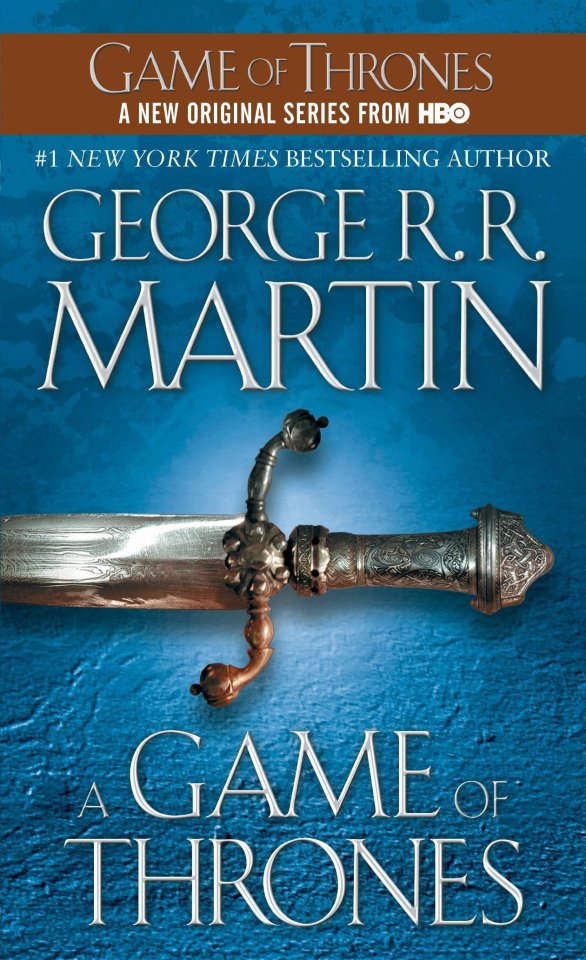
0 notes
Text
The Watch Review
Looking back on last year, if 2017 taught us anything, it’s that we really need to spend some time looking at how we view issues of gender, and how traditional views on the topic—unexamined—can allow a dangerous and damaging status quo to survive and thrive.
The Watch is a game that examines gender roles and the dangers of failing to challenge traditional ideas about gender relationships, and frames that examination in an epic military fantasy narrative. It is a Powered by the Apocalypse game that was on Kickstarter last year, and entered full distribution at the end of 2017.
It has been a while since I put this disclaimer in place, but I feel like I should issue it here, once again—when I review a game, I’m looking at using the game at the table, and my ability to recommend it to a wide range of players for use. That is a separate measure than evaluating a game’s importance, or its value as art.
Appearance and Structure
This review is based on the final PDF version of the RPG. The PDF is 175 pages—this includes a three-page index and a two-page index specifically referencing the moves in the game. The book is in black and white, except for the accent color on the cover, highlighting the title in red.
The interior art is all line art by Claudia Cangini, and it helps to reinforce a consistent look and feel for the game. The art is clean and presents a wide range of character types in combat and at camp, which mirrors the flow of the game, following characters on missions and between them.
Before the Shadow and Preface
The initial sections of the game detail what the setting looked like before the current crisis that the PCs will be playing through, and then explains the premise of the game, in broad strokes. It also discusses gender, in general, and how it relates to the theme of the game.
The setting was—before the shadow—a somewhat standard fantasy setting organized into various clans, some of which had their own rivalries and grudges. The Shadow arrived, and forces the clans to work together to confront some uncomfortable realities of their existence.
There is a very clear discussion on the theme of the game. Gender identity matters. The Shadow acts most strongly on those that identify as male, and this pull is based on identity, not genetics. This is very important to the theme of the game, because it is very clearly stated that The Shadow is a fictional representation of the negative effects of toxic masculinity on a society.
Women are not immune to the Shadow, but those that identify as male have a much harder time resisting, which has led to The Watch, the military of the consolidated clans, being formed from the women of the clans. Males from the clans are kept away from the front lines, as the males taken by the Shadow are twisted, over time, into dangerous creatures.
No one is immune, but males must sit on the sidelines. The important aspect of this situation isn’t that “men are bad,” but that the women fighting to protect their society can’t afford to assume that some of them are “the good ones” until the Shadow is confronted and defeated.
The Basics
This section gives a broad overview of the concepts that are common to many Powered by the Apocalypse games, such as rolling when moves are triggered, what playbooks are, stats, and the terminology used. If you aren’t familiar with these terms, playbooks serve as character sheet/character class hybrids that players can choose for their characters.
The chapter refers players to the X-Card, created by John Stavropoulos, as an example of a safety measure for use in the game. The importance of safety tools, and respecting the boundaries of players, is also addressed. Given that the game touches on topics of gender, the problems that arise from toxic expressions of gender stereotypes, war, and loss, it’s a very important piece to keep in mind.
Moves are triggered by the fiction. Players discuss what their characters are doing, and if those actions align with the description of the moves defined in the game, a roll is made, and the MC that is facilitating the game helps the player adjudicate what happens according to the roll.
The Watch has a slightly different way to track advancement—in addition to the more standard experience track it also has a Jaded track.
Characters get experience for completing missions, or by using highlighted moves from their playbooks—this experience can be used to buy various expanded moves native to the playbooks
Characters can also mark Jaded on their sheets when the war against the Shadow hardens them—they can take Jaded moves as the track fills up, but too many Jaded moves, and the character leaves the fight against the Shadow, one way or the other
Characters also track multiple states in the game to model the effects on the ongoing war effort, and the connection the characters have to others fighting in that war.
Characters track weariness when the rigors of war get to them—when the track is filled up, or when the MC is willing to let them remove all their weariness, they make a move representing the effects of weariness on them
Characters also track camaraderie to show how close they have become to other characters in the war effort
Weariness is often used as a consequence of various moves, such as turning down a request from another player
Camaraderie is used instead of the “Help” move of some other Powered by the Apocalypse games, spent to boost the roll of another character when they attempt to do something
If a character has Camaraderie with a character that dies, and a PC performs the Delivers a Eulogy move, Camaraderie with the fallen can be converted to Experience or Jaded, depending on how each character wants to view their state when the Eulogy was delivered
I really like the economy that is set up with Camaraderie, Jaded, and Weary. They play into the feeling of an ongoing battle against oppressive evil extremely well.
Using Camaraderie as a currency for helping is more exciting, to me, than just having a help move, and it reinforces the need to rebuild more of it between characters. Being able to cash it in for advancement currency, and the fact that it can be gained with NPCs, gives PCs a reason to get invested in characters outside of the immediate circle of the PCs and their commanders.
Jaded is a well-executed double-edged sword, allowing a character to learn from their experiences in a way that also shows that they are getting worn down by that knowledge.
The only aspect of the rules, to this point, that doesn’t excite me, is highlighting moves for XP. While slightly different than highlighting stats in other Powered by the Apocalypse games, it is similar enough that it makes me wonder the same thing that I do in games that use highlighting for XP—what does this say about the fiction? XP for failure, saying yes to questions about events that unfolded, and completing mission goals all speak to reinforcing a genre or the core concepts of the game, but I’m not as clear on what highlighting some specific stats or moves reinforces.
Moves, Characters, and Playbooks
The next three sections of the book deal with explaining moves in more depth, explaining what characters in the setting look like, and give the specific details of the playbooks used in this game.
The section on moves will be familiar to someone that has played in a Powered by the Apocalypse game in the past, but it also summarizes the specific moves that are native to this game. The explanation of how moves work and how they are triggered is very clear. I’ve noticed, in the past, that some Powered by the Apocalypse games lean very heavily on using very similar terminology and expressions to the original Apocalypse World rules, and in some cases, that can lead to some confusion when a reader isn’t familiar with the original game.
In this case, while some of the terminology is used again later in the book, the introductory language is very clear, and the repeated phrases and terms end up being useful for consistency with other, similar games, but not too arcane for a new reader to pick up if this is the first exposure they have to a game using the same conceits.
Characters end up choosing from several clans, that may still be dealing with past rivalries, and can add complications to the effort to overturn the Shadow. They can also advance in rank, so that they can choose what order they approach missions in the overall campaign. Players are also presented with their own principles and agendas to keep in mind.
The game uses the following playbooks for the player character options:
Bear—The fierce, protective, and maternal character
Eagle—The glory seeking, high-ego character
Fox—The mystical, spiritual character
Lioness—The charismatic and inspiring character
Owl—The sneaky troublemaker character
Raven—The philosophical and potentially religious character
Spider—The creepy, mysterious one that might poke around with dark powers
Wolf—The aggressive, pack-oriented character
Some of the playbooks pick up some supernatural flavor, but powers tend to be more mystical and subtle, rather than overt and offensive. You can seek answers or travel through the spirit realm, but not throw fire and lightning around.
At the end of each playbook summary, there is an explanation of how to play the character, as well as some elaboration on how to use the moves specific to that playbook. I like the added context, but there are a few moves that feel like the actual move description could have been clearer, rather than being fleshed out in the explanation at the end of the playbook—mainly because it might not be obvious that there is more of an explanation of that move outside of the move itself.
MC
The next section in the book, after the player facing information, is directed at the MC. This section details what the game is about broadly, then goes into the agenda and principles of the game.
While it is touched on earlier in the book, this section opens with a clear discussion that the game is about taking the standard fantasy trope of banding disparate people together to fight a great, powerful evil, and viewing that through the lens of the great and powerful evil being the patriarchy.
The MC agenda is spelled out, as well as the principles for running the game. For anyone unfamiliar with a Powered by the Apocalypse game, these are bullet pointed ideas to keep in mind to help reinforce the theme of the game and to keep it moving in the right direction. For each of the agendas and principles, there is a more detailed section explaining what those agendas and principles look like when put into action in a game.
Typical adversaries for the campaign are explained. This includes not just the being corrupted by the Shadow, but also traditionalists and ultra-radicals in the clans that might undermine victory against the Shadow. There is also a section where MCs will define the traits and specific goals of the Shadow, with the Shadow picking up more goals as the PCs get closer to defeating it. Those goals may make the Shadow more dangerous, but also more reckless, as it gets closer to losing its hold on the world.
The potential issues of running a game with the themes being employed is also addressed again in this section. It is stressed that the oppression being highlighted should not involve sexual assault—it’s about how aggression, systematic oppression, extreme competition, and status undermines society. There is also some recommended reading for better understanding and sensitivity about the issues touched on in the game.
The way the MC’s job is expressed in this section is clear, but there are some elements that I felt could have been streamlined. Instead of the traditional hard/soft move split (usually having something dramatic happen versus explaining to the players that something dramatic is about to happen, depending on the actions they take next), the text goes into separate explanations of moves split into the following categories:
Softest
Soft
Hard
Hardest
I’m not sure splitting hairs and adding that level of granularity does much for running the game. In fact, a lot of new MCs in Powered by the Apocalypse games need to get used to the concept of making hard and soft moves, and the added layers that have fuzzy boundaries don’t seem to yield much additional value.
Principles, in many Powered by the Apocalypse games, are relatively few and concise. The Watch has 14 principles, some of which are fairly long. They aren’t easy to call to mind or quote from memory. Many of them feel as if they dovetail with one another, and some of them feel like general advice for running games, instead of things to keep top of mind for reinforcing the tone and pacing of The Watch, specifically.
If the MC is using the MC moves, as they are expressed, they will naturally do some of the things that are spelled out in the principles, which means some of those principles could be folded back into other principles. For example, “Keep Clan Politics an Ongoing Problem” is a principle, but one of the GM moves is “Bring Clan Politics into It,” so couldn’t we roll that principle into “Think About What’s Going on All Over the Nation?”
Missions
This section of the rules spells out how a campaign will work. Campaigns are split into separate phases, and are designed to show how the world changes as the Shadow is challenged, and how the stakes are raised as time goes on.
Each phase of the war against the Shadow has several missions under it. There is one mission that “ends” that phase, which cannot be undertaken until most of the missions on the list for that phase have been completed. This allows the players and the MC to decide if they want to tackle all of the missions, or just a majority of them, before brining that phase to a close.
There are mission specific moves that are described by the player that is fulfilling a specific role, and they describe how that character will complete an aspect of the mission. Complications can arise from a 7-9 on mission rolls, such as having something following the players back to their home base after they have conducted a mission—this will require them to deal with the fallout of those complications.
In the final phase of the campaign, there are more dramatic complications that kick in, and in the middle and at the end of the campaign, there are “Changing the World” moves. These moves involve the players naming something they want to see change in the world, and how they are attempting to change that aspect of the world. Their rolls will show if that change is happening, if it is happening globally, or if change is limited to individual clans and regions.
I love this structure for this style of campaign. It would have been easy to set up the playbooks and the world and the advancements, and tracking everything that gets tracked, and then just leave it up to the MC to play as long as they want to resolve the story. In this case, however, there is a structured progression with built in rules to model the higher stakes as the player characters get closer to saving the world. Some games lay out a lot of tools to play an epic campaign, but if feels as if you are missing some of the steps to get from the beginning to the middle. Here the steps are laid out as well.
If there is one aspect of this campaign structure that I wish were handled differently, it is the broad wording of the Changing the World move. I wish it had a bit more guidance on the kinds of social issues that might still be present in the Clans, outside of the Shadow’s influence, so that it’s not quite so wide open for the MC and players to need to invent problems to solve. Keeping Clan politics in the forefront, and as a source of friction might help to generate the fiction needed to make this move work, but examples and guides are always nice.
Final Thoughts, Appendix A, and Index
The theme of this game is so important to modern society that it can’t be understated, but the way in which the theme is summarized for a fantasy setting makes it very approachable and understandable when mapped to standard fantasy tropes.
There is a nice rundown of how to cut down the initial character creation and setup to facilitate running The Watch as a one-shot game, explaining how to prioritize, cut out, and summarize the first session checklist provided earlier in the book.
There is also a separate moves index aside from the overall index, for quick reference.
Leading the Charge
The theme of this game is so important to modern society that it can’t be understated, but the way in which the theme is summarized for a fantasy setting makes it very approachable and understandable when mapped to standard fantasy tropes. In addition to the execution of important themes, the structure of how to run a war against an evil overlord in an epic fantasy setting is something that will be worthwhile for a wide range of GMs to look at.
The Fog of War
While the initial explanations are clear and on point, the specific MC advice gets a little muddy in the middle of the book, with some principles that don’t summarize as well as they could, and some expansion of what hard and soft moves are, without gaining much from that expansion.
Recommended—If the product fits in your broad area of gaming interests, you are likely to be happy with this purchase.
This game is worth checking out for a wide range of gamers. It addresses some very important topics utilizing tropes that are almost universally familiar. It uses Powered by the Apocalypse inspired rules in a manner that expresses the rigors of war, the progression of a campaign, and escalating stakes.
Let me know what you think of The Watch, epic fantasy warfare, and what you might want to see in upcoming reviews. I’ll look forward to your comments, and I hope to get the chance to discuss this and other reviews with you.
The Watch Review published first on http://ift.tt/2zdiasi
0 notes
Text
Film Review of 2016
Disappointments
Since everyone seems so keen to dispatch 2016 asap, let’s start on the downers!
2016 has definitely had its occasional moments but we seem to be fast converging on a generic blockbuster soup. The year was littered with blockbusters which had both impressive visuals and charismatic performances but also had nothing new to say, beyond sticking a franchise marker in the ground (Doctor Strange, Fantastic Beasts, Ghostbusters, Kung Fu Panda 3, Warcraft, Jason Bourne, The Magnificent Seven & even the largely over-praised Civil War). Whilst all of these films passed the time well & were basically enjoyable, there is the ever-increasing whiff of missed opportunity around the primary Hollywood fare. Less successful were Independence Day: Resurgence (distracting but pointless) and X-Men Apocalypse - an uneven, florid and unexpected misfire, although nowhere near as far behind Civil War as was generally made out.
Meanwhile, over in the DC Universe, Warner Brothers kept fumbling what should be their easiest win. From a low start, Batman vs Superman fades badly on repeat viewings (even the ballyhooed Special edition). There are definitely no problems in their casting department and I remain a fan of Cavill; his mournful look in the courtroom is played magnificently. Ben Affleck’s Batman was expertly portrayed but bore almost no resemblance to the essence of the character that I for one love, delivering in his place a psychopathic fascistic jackass who was a far cry from the world’s greatest detective. How we’re supposed to root for him then or in the future is a mystery - I would honestly take Clooney’s portrayal over this. Poor Affleck - he delivers what he is given magnificently; blame the architects and not the builder. Gal Godot’s cameo keeps me hopeful that Patty Jenkins may just save the whole damned thing with Wonder Woman next year, but Warners are certainly running out of strikes. The idiotic shambles of Suicide Squad was only barely saved from one-star dreck by the huge charisma of Will Smith & Margot Robbie, and whatever spark the concept started with seemed produced and edited into manufactured oblivion. To make it worse, DC’s TV shows remain such charming and silly fun: I wonder how much appetite standard audiences still have for the upcoming JLA films.
Arrival came trumpeted with massive critical heraldry but I was greatly disappointed. I found it derivative (Torchwood: Children of Men with the pilot & finale of DS9) and, as with The Martian and Interstellar, flirted with scientific ideas (which film reviewers mistake for “intelligence”) only to discard them for woolly sentimentalism. Only Zemeckis’ Contact reigns supreme in this expanding genre of science storytelling and, even though the performances in Arrival were compelling, the film (albeit decent) left me greatly frustrated.
Another smash hit that I did not care for was the Secret Life of Pets, a tedious and rambling Toy Story knock-off (though my daughter loved it so what do I know?) but nothing compares to the real disappointment of the year- Swiss Army Man. My take was this: a smug, cold, flimsy and empty experience, it became the first film I’ve walked out of. Ever. In fact I did so about 5 minutes before the end, since I knew exactly where it was going and was so disengaged that it was only going to annoy me. I should add that I do like very much that the film exists and I could imagine friends and reviewers whom I respect loving it (as many did) but it bounced off me completely and ultimately left me irritated and even a little angry.
Moments
In the midst of an uninspiring year for cinema, there were still a few moments which blazed through the repetitive fug & reminded me how joyous cinematic storytelling can be. Spielberg’s BFG had many such notes, from the visual poetry of the Giant silently twirling through the shadows of London to the childish joy of the whizzpopping Queen. Other moments of delight included the moment of “Hang on - are they doing this? - oh Yes They Are!” when the Beastie Boys’ bassline kicks in during the final act of Star Trek Beyond and, whilst The Revenant may have been a tad indulgent, the bear attack had me yelling at the screen. ��Any scene featuring Flash the Sloth in Zootropolis was laced with comedic genius whilst our arrival in the city, combining Shakira’s perfect pop with gorgeous animated depth and colour, was magical. Ryan Gosling’s masterclass of toilet gunplay clowning in The Nice Guys was only topped comedically by the rampant and prolonged genius of the game of “Would that it were so simple” tennis in Hail Caesar! But narrowly pipping that for my cinematic moment of the year though, was Lord Vader himself.
I feel conflicted over Rogue One as ultimately it is yet another film which exists because it can, not because it needed to. To note the lack of comment about the unsettling fake Peter Cushing (squarely in the uncanny valley) after the shrieking which greeted the prequel trilogy’s “Dodgy CGI!” headlines perpetuates the accepted myth that those films are disasters to discard but I see little difference. Rogue One is another three star entry to the saga; I’d put it on a level with Attack of the Clones in terms of quality, ahead of Phantom Menace. Disney have a whole Galaxy to explore but choose to sustain the increasingly weird trend of aping preceding classics with an echo instead of trying out a new voice. Quite what Joss Whedon made of the final act is anyone’s guess: “the feisty rebels fight their way past a space armada (losing comedy relief Alan Tudyk along the way) to climb a radio antenna so they can send out the message to topple the evil empire” rang a few bells with me anyway. Rogue One also felt choppily re-edited (what was with the psychic space octopus?) whilst the new characters didn’t really land at all. Indeed directly after leaving the cinema I (and all of my party) struggled to name any of the characters (Erm…. Jinn, the moustache guy, the blind guy, his mate, the pilot, Forest Whitaker, the funny droid, the small thing that looked like a testicle…). Despite this problematic emotional deficit we were treated to some glorious set pieces and nicely pitched beats, but when Darth Vader’s lightsaber illuminates his terrifying visage we are treated to a moment of cinema as resplendent in its awesomeness as it was shamelessly gratuitous. After my considerable mithering about not being able to share Star Wars with my children last year it was almost a relief to see such a grim conclusion (No Way is it suitable for under 10s) but it makes me return to my wondering of who Disney are making these films for. Episode VII is rumoured to be “darker” still; where is the cheerful space-fairy-tale where we all started? Eventually they’ll stray too far from Lucas’ indelible first film (still the finest of the lot, for me) and step back cinematically but they run the risk of increasingly diluting the specialness of the whole thing. The fun “Star Wars Rebels” TV show fills a bit of this gap but even that has clouds of doom in the background (although seeing Chopper & The Ghost in Rogue 1 was a nice touch). Maybe after the sad loss of Carrie Fisher last week now isn’t the time to whinge about gloom in the Star Wars Universe, but I feel that my love for the franchise is certainly starting to be tested.
The year in numbers
Number of films seen: 93
Way down on other years- I blame box sets).
Number of ***** films released in 2016 : 0
This happened in 2011 too, but I’d normally expect at least 3.
Number of 2016 releases seen: 32
About par for the course.
Number of cinema trips:29
Again about my average: I’ve been to the cinema 188 times in the past 6 years.
Number of new films seen:51
I’m improving here, which pleases me.
Most anticipated for 2017
Baby Driver
Edgar Wright’s films are ace (except that one which I don’t mention since people shout at me).
La La Land
This looks gorgeous and I thought Whiplash was sensational.
Logan
I like everything about how this looks.
A Monster Calls
Original storytelling! Yes!
Paddington 2
Obvs.
Star Wars Episode VIII
A New Hope?
T2: Trainspotting
Hugely exciting- these film makers have only grown more talented in the past 20 years.
20 years.
Gods I’m old.
Thor: Ragnarok
My favourite Marvel franchise goes comedy-space loopy. Has the potential to be my favourite of them all.
Wonder Woman
I love this character and I want my daughter to as well. Get this right DC. Please.
-----------------------------------------------------------------------------------
Missed during 2016 but would like to have seen:
Allied, the Big Short, Finding Dory, Midnight Special, Money Monster & Passengers. I also did not see either Room or Spotlight, because I was never in the mood for the grimness of either. Look, I’m busy and I’ve turned 40. Can you tell?!
Top 10 films of 2016
Bubbling Under: The charming and colourful Moana and also Kubo and the Two Strings were superior family fare whilst The Jungle Book was an immersive treat.
10 The Revenant
Technically stupendous but also oddly emotionally detatched and often needlessly arty- truly great cinema puts storytelling before craft and allegory with the latter drawn from the former (if it can) and I felt that, despite the stupendous cinematography and artistry on display, that beauty was sacrificed for emotional or narrative strength- certainly for plausibility. I’ve had these issues with Iñárritu before, but there is no denying the fact that this remains a remarkable piece of cinema.
9 Deadpool
Actually a bit more sharp than I’d first realised and a clever piece of programming, but still not what it could be if it halved the budget and really cut loose.
#driveby
8 10 Cloverfield Lane
The main problem is the name (It has nothing to do with the 2008 film and I was always waiting for them to tie together), but the claustrophobia and paranoia are immersive, shocking and unpleasantly tense.
7 The Hateful 8
A trifle indulgent at times, but a terrific theatrical experience.
6 The BFG
Not as comedic as you’d think, with a pervasive melancholy vibe of loneliness, guilt and regret emitting from the screenplay, lead actor and the director. It takes a while to get going and doesn’t aim for huge emotional sweeps, but the patient craft of Spielberg is clear to see. The BFG is lovely filmmaking with a real gentleness at its core and it will only grow in reputation over time. Also features explosively farting Corgis.
5 Star Trek Beyond
The best Blockbuster of the year I was surprised and delighted to see how much it grew on repeat viewings. This warm and witty love letter was assembled at huge pace but it made for a thrilling piece of cinematic escapism. A considerable improvement on its predecessor, the highlights were the pairings of the characters, especially Spock & McCoy. They did fudge the character of Kirk a little in order to both complement the story’s main theme & provide a suitable reflection in the villain and as a result Kirk is, paradoxically, the least convincing part of the piece but, after a terrific and assured finale and beautiful grace note for the 50thAnniversary, the films ends perfectly with the whole crew, as it should.
4 Hail Caesar!
Another film that gets better the more you think about it, Hail Caesar! loves movies almost as much as its protagonist and this feels like one of the Coens’ more personal films. Their goofy wit is littered throughout it and it nods to cinematic tradition constantly, including some wildly unnecessary set pieces which spectacular and as fun as there are knowingly indulgent.
3 The Nice Guys
Quintessential Shane Black it may be, but his voice is so distinct and entertaining that a film with this level of charisma is hard to take against, no matter how familiar the ingredients might be.
2 The Man who Knew Infinity
A truly delightful surprise, I was expected this to be a guilty pleasure (given my love of Maths and knowledge of the subject matter) but instead I was treated to a terrific piece of film making: quiet, earnest, substantial, well acted and gracefully told. Seek it out! It may appear like a generic biopic but the subtle exploration of Ramaujan’s talent and his faith and the search for absolute truth in both Mathematics and Religion that connects him to Hardy (along with circumstance) is well rendered. It is certainly considerably superior to the Imitation Game.
1 Zootropolis
So Disney has eclipsed Pixar- that Lassiter dude certainly knows what he’s doing.
I’m pretty amazed to see this as my film of the year, as it is a kids’ film, a cartoon. And yet, when I look back on everything I’ve seen over the past 12 months, it is the one film which made me smile the most and it continues to grow on repeat viewings (which my children beg for). It is kind of expected that incredible colour, imagination, design and wit are de rigueur in these films but not only does Zootropolis get all of these ingredients exactly right, it sneaks in small hints of profundity. After a year in which unsavoury debates have been poisoned by irrationality, this film, without every threatening to be preachy, gently illustrated to my children exactly the message I needed them to see. The core of the film concerns how we can get judged by what we are, not who we are or what we do and even both protagonists, who are wildly different, fall into this trap during the course of the story. Judging a book by its cover is in our DNA but reflecting on how we process this instinct is something that struck a chord with me, long after my first viewing. Concepts of “Them and Us” are challenged directly but without ever lecturing or straying from the narrative or the wit. The film is subtly layered both narratively (themes of exclusion and lack of purpose are examined through deft comedy) and visually (a quick rewatch of the final 10 minutes allowed me to spot nods to Speed and The Empire Strikes Back) and the music and humour are hugely pervasive. It is no masterpiece but is certainly the film I needed in 2016.
This may be a cheesy way to finish the year but the lyrics to the (frighteningly) catchy main song from Zootropolis contains a message for Film Producers (despite being sung by an alarmingly sexy gazelle):
“I want to try everything, I want to try even though I could fail; I’ll keep on making those new mistakes.”
I’ll take more Swiss Army Men every now and then if it leads to more Whiplashes. Let’s hope to see cinema trying everything in 2017.
Happy New Year!
0 notes